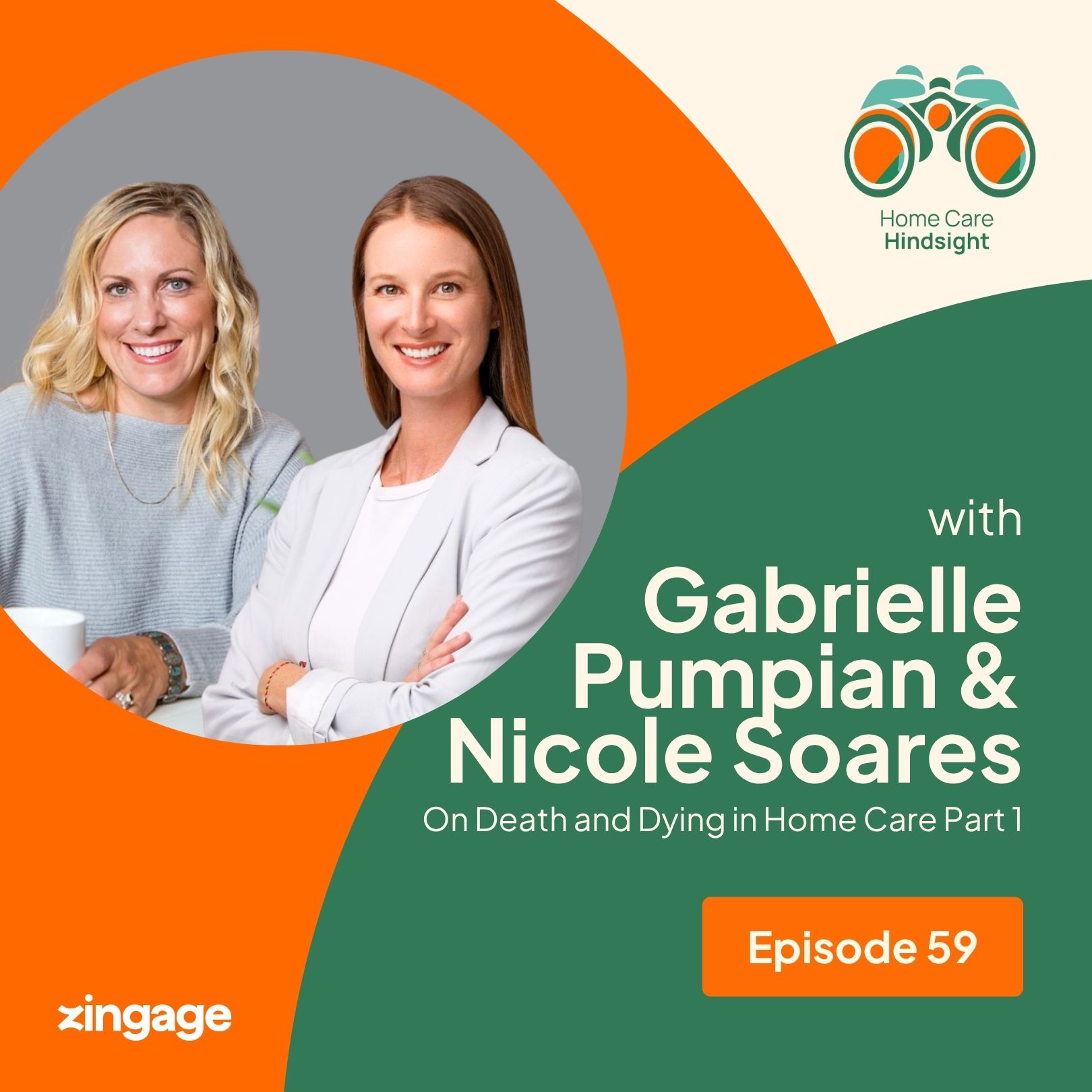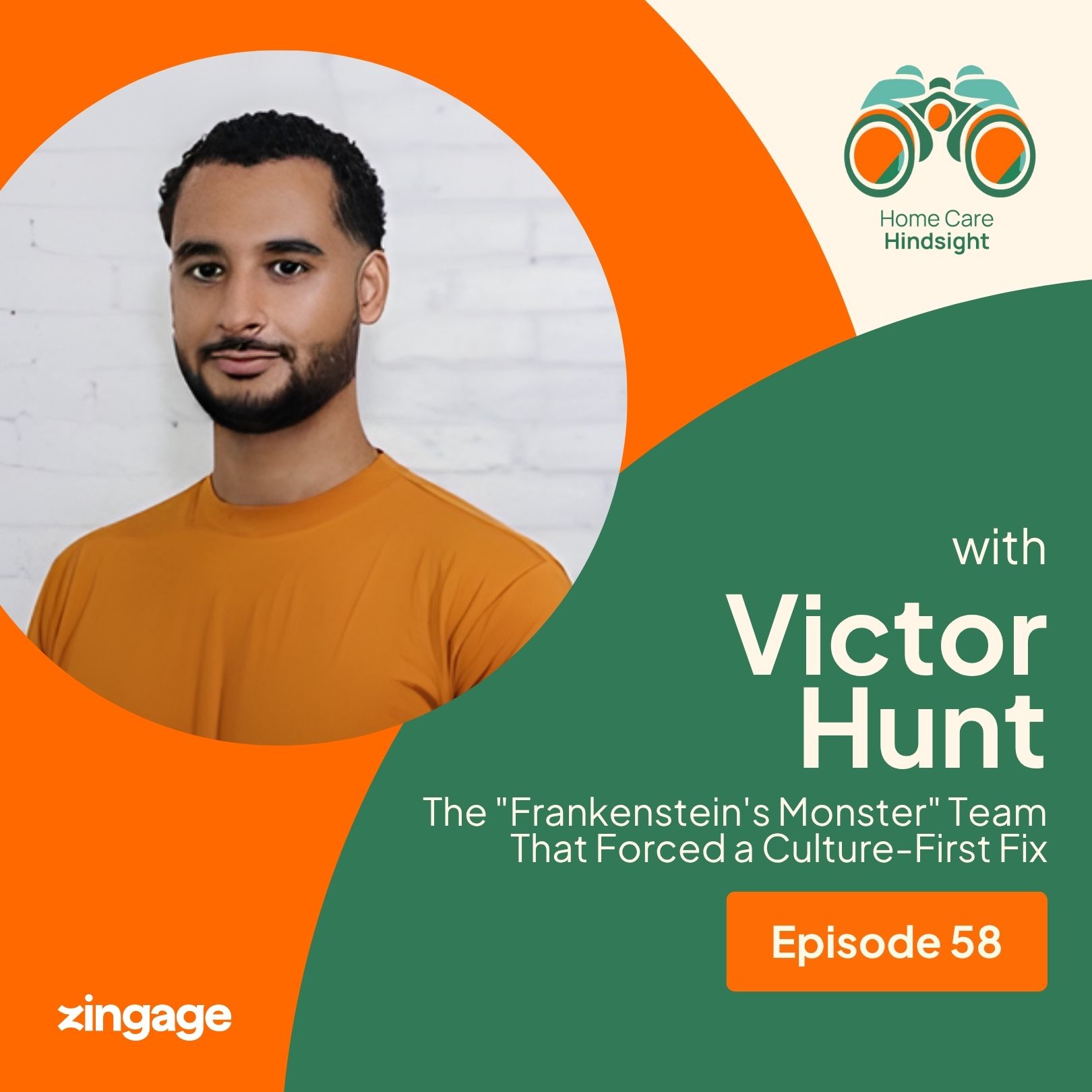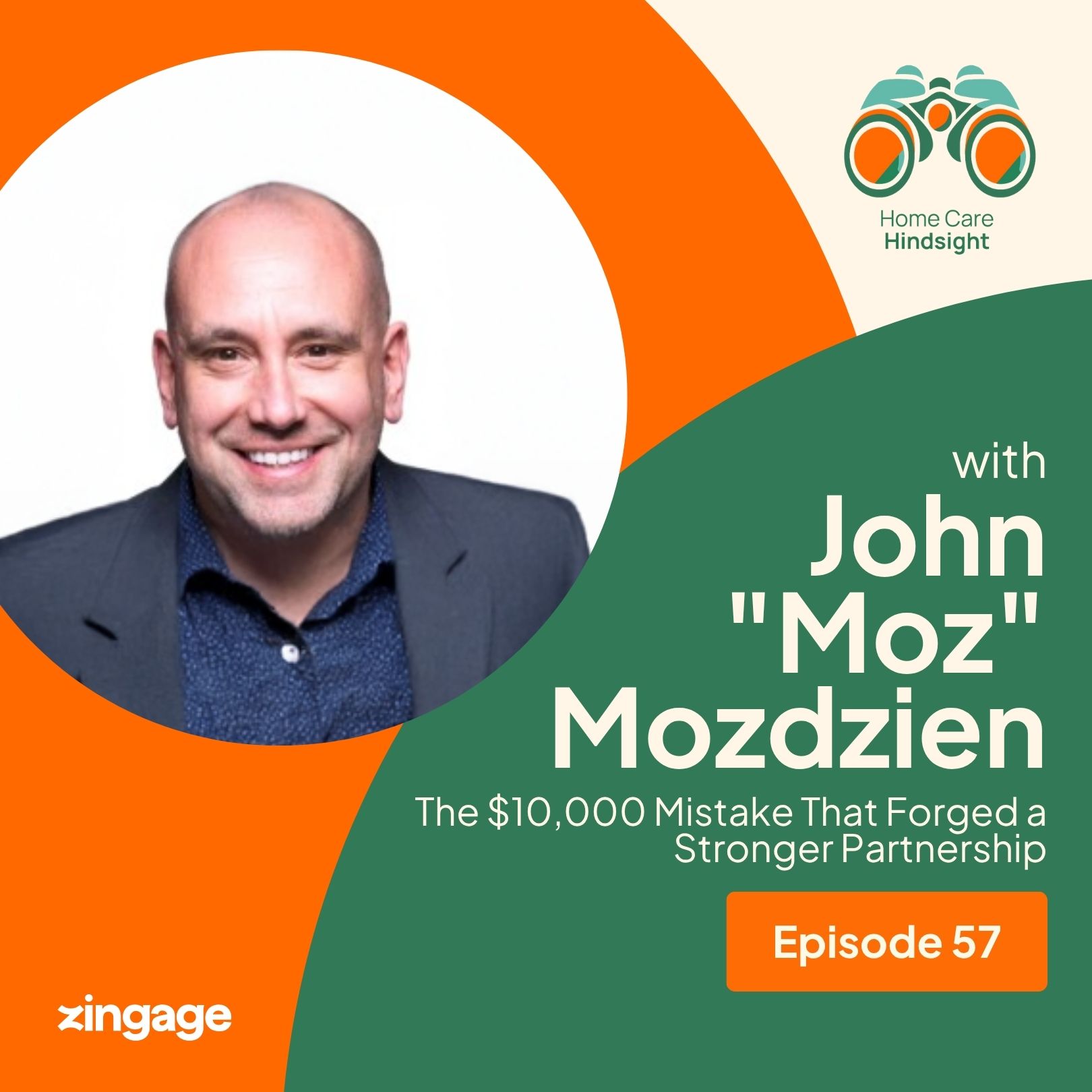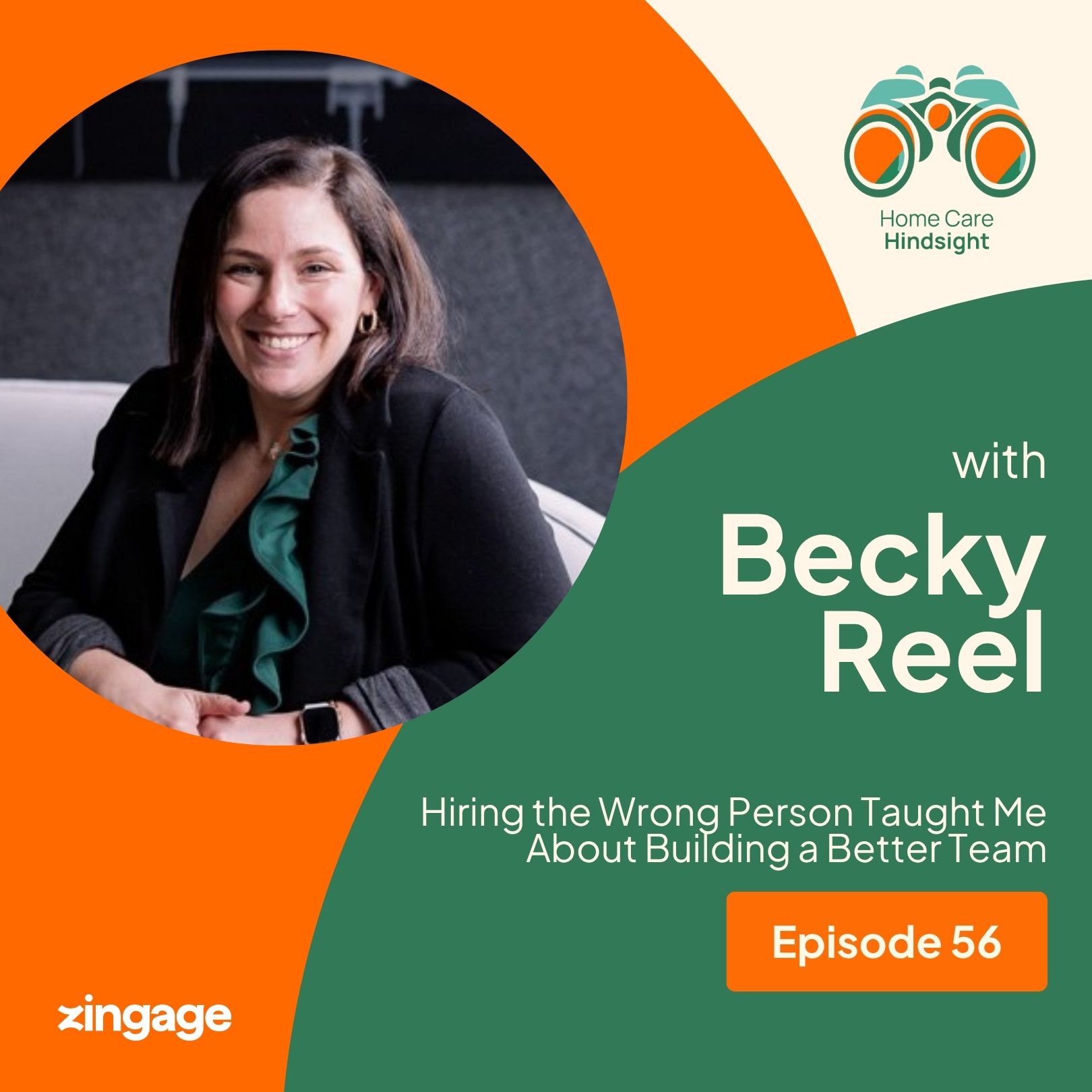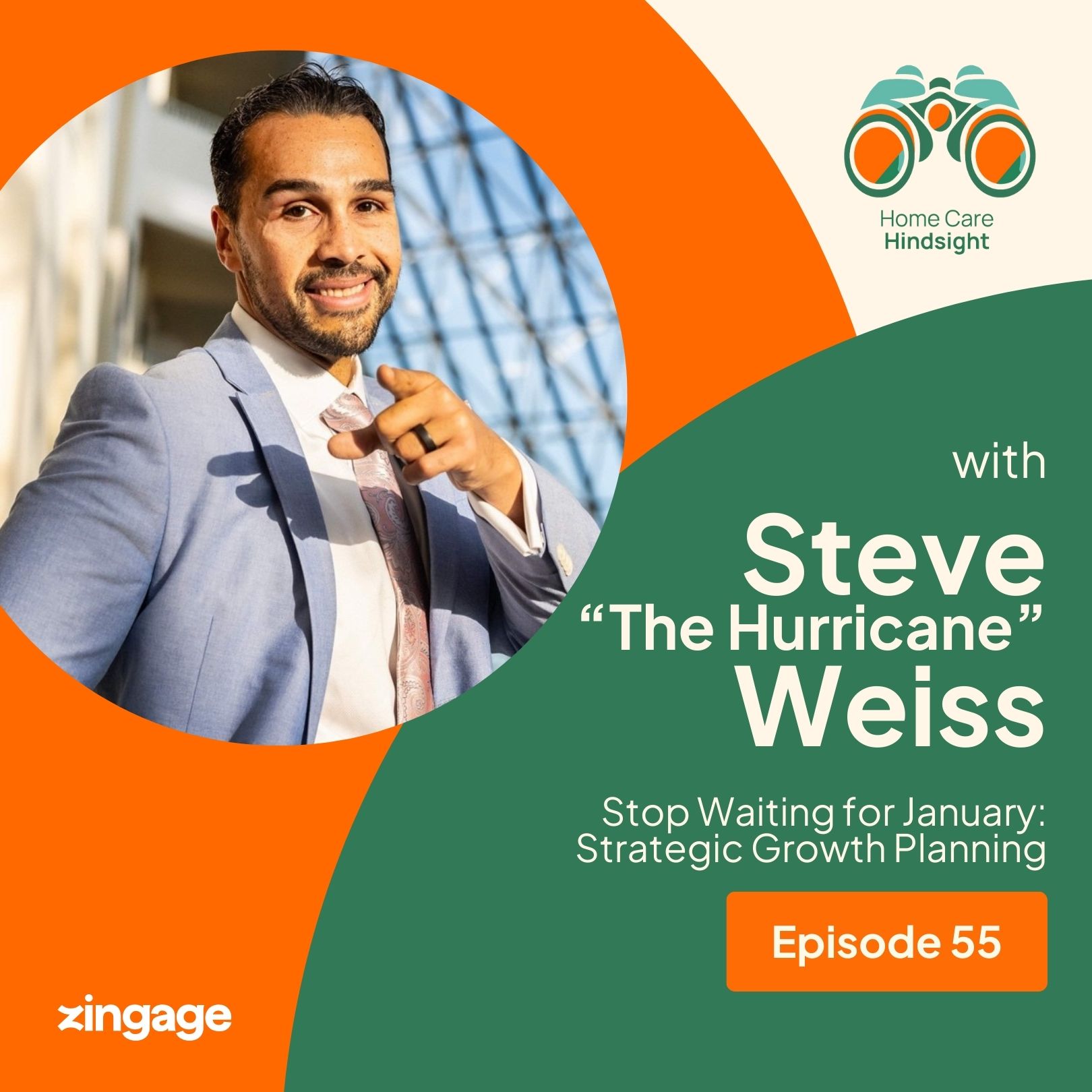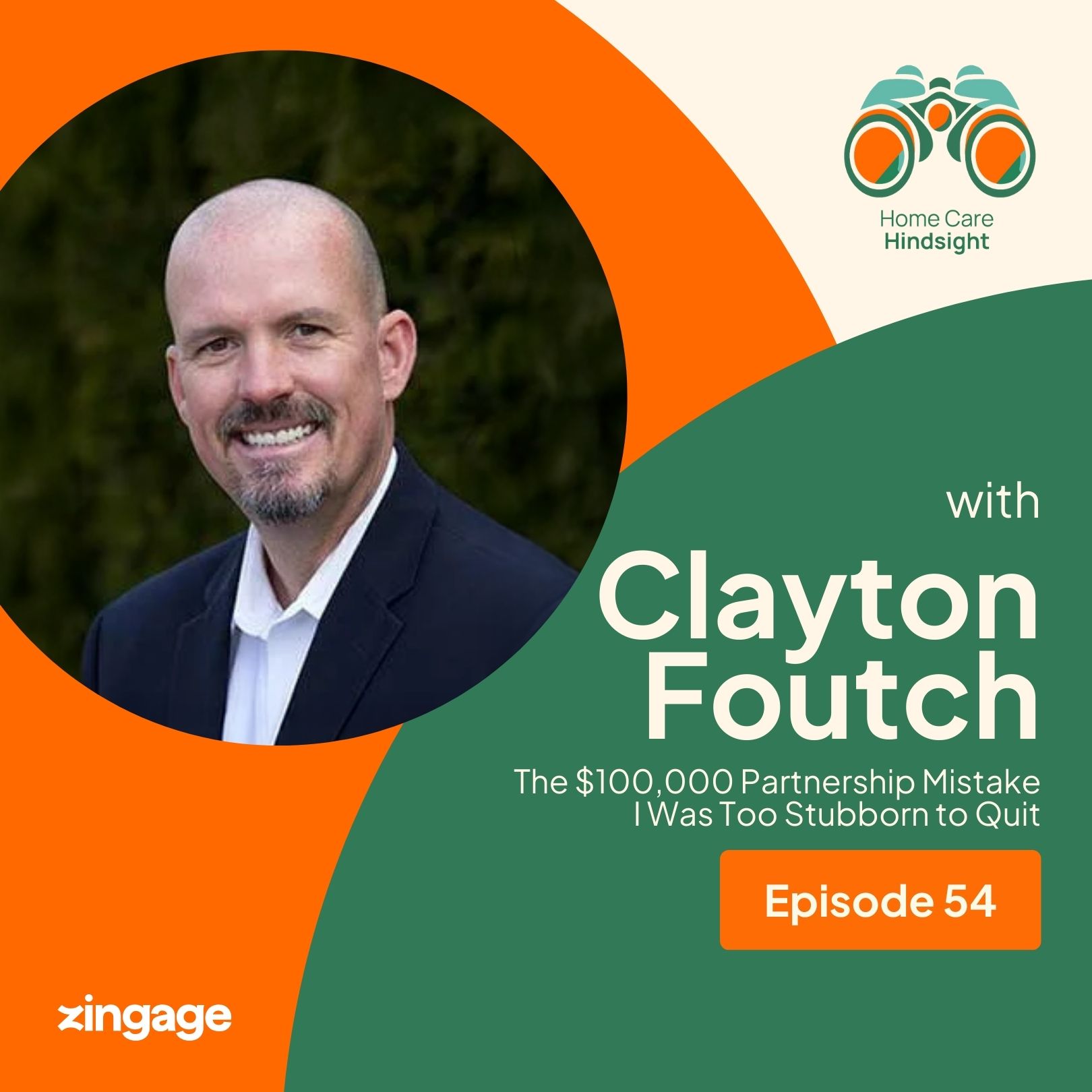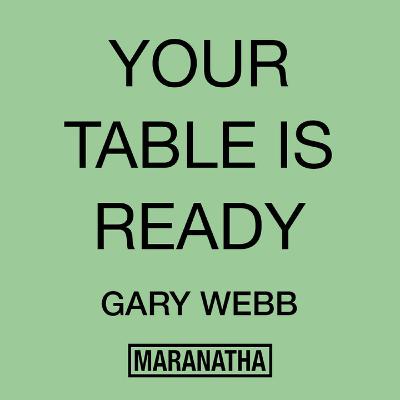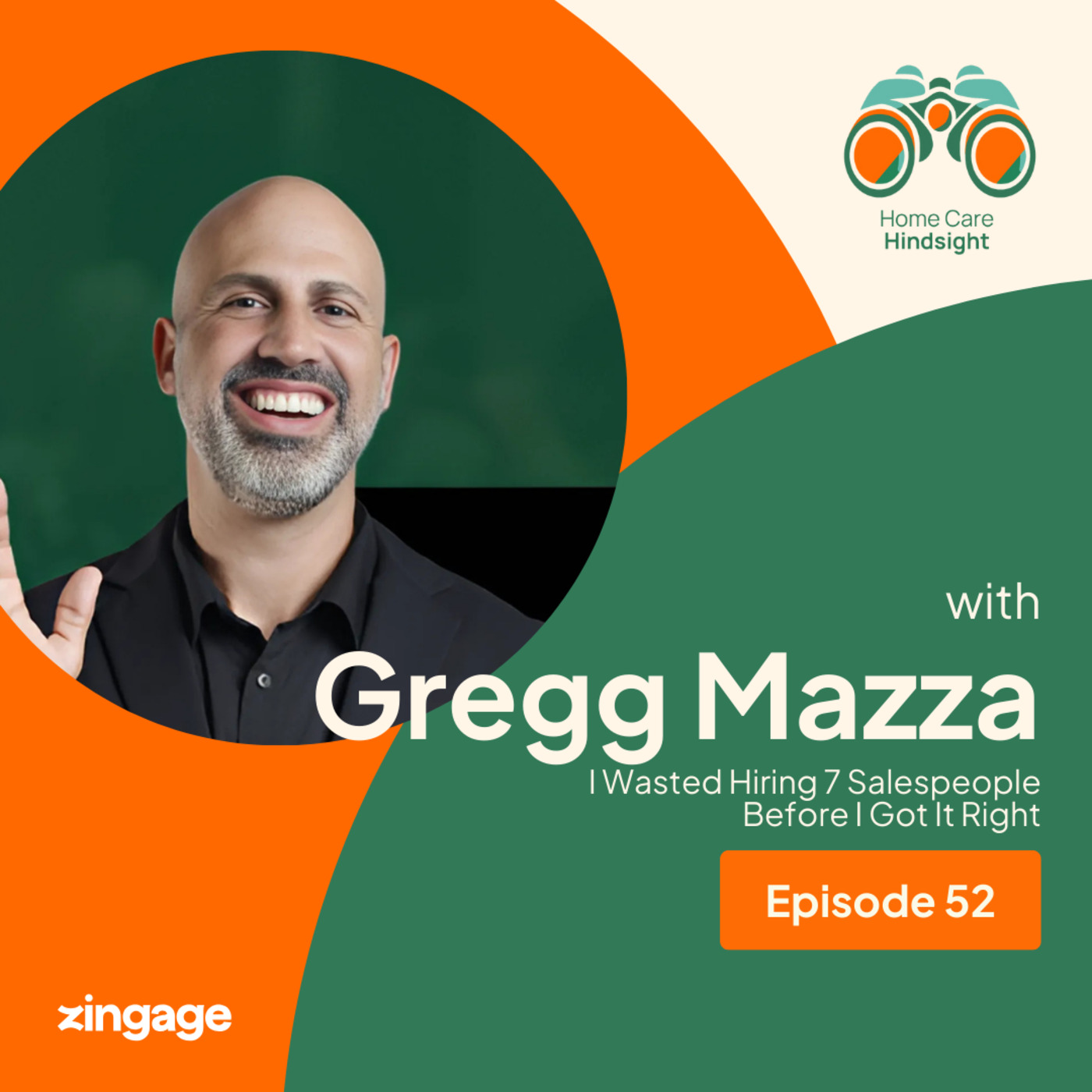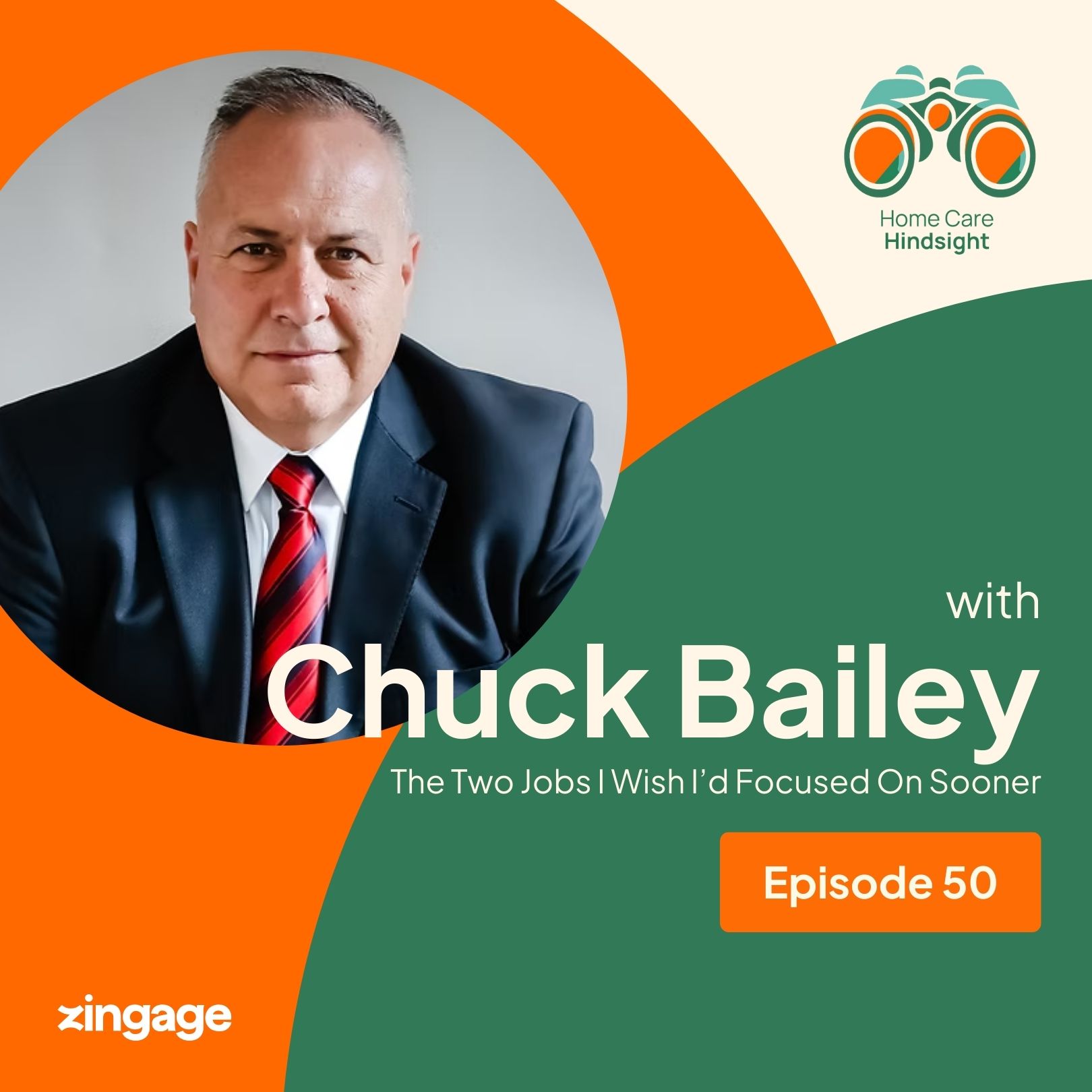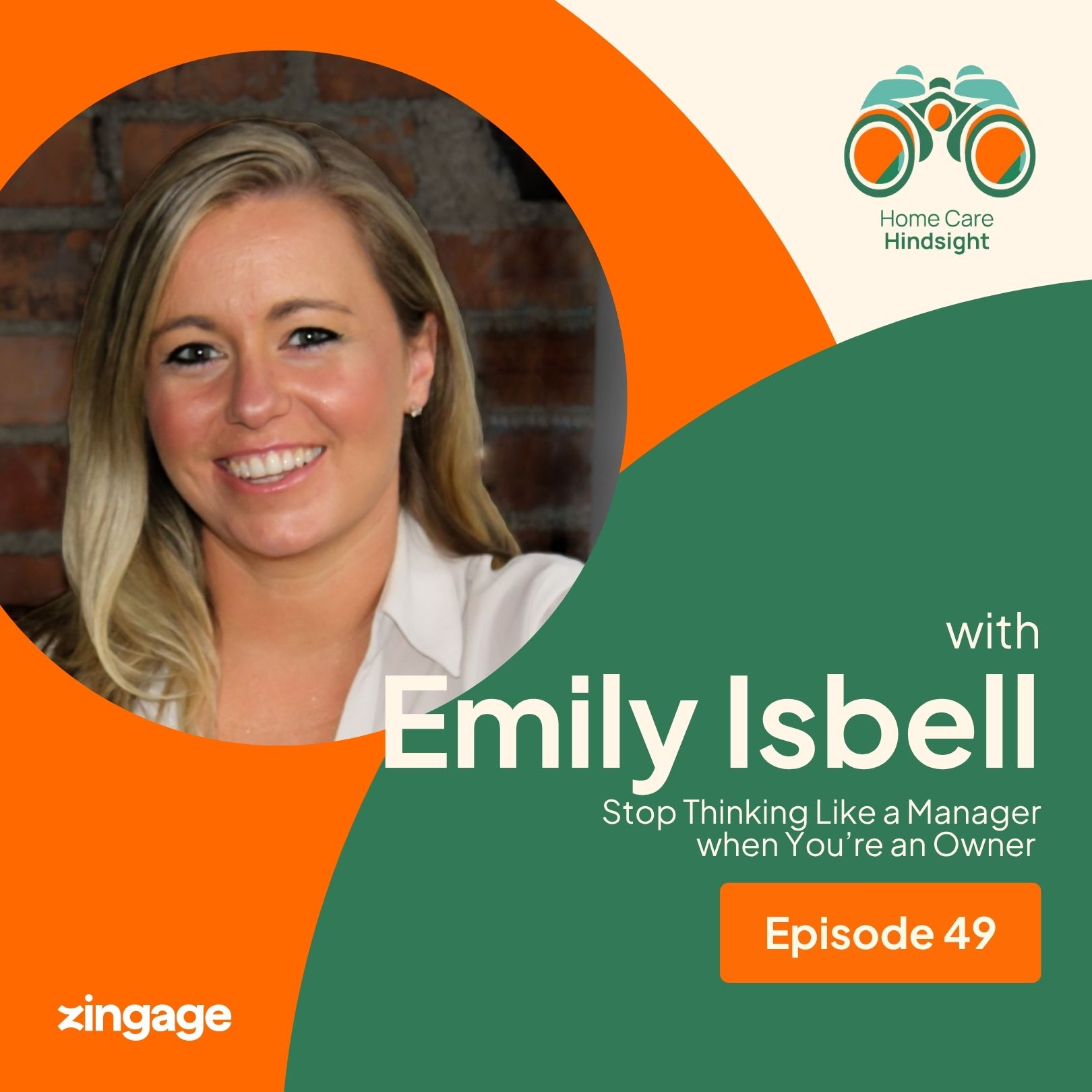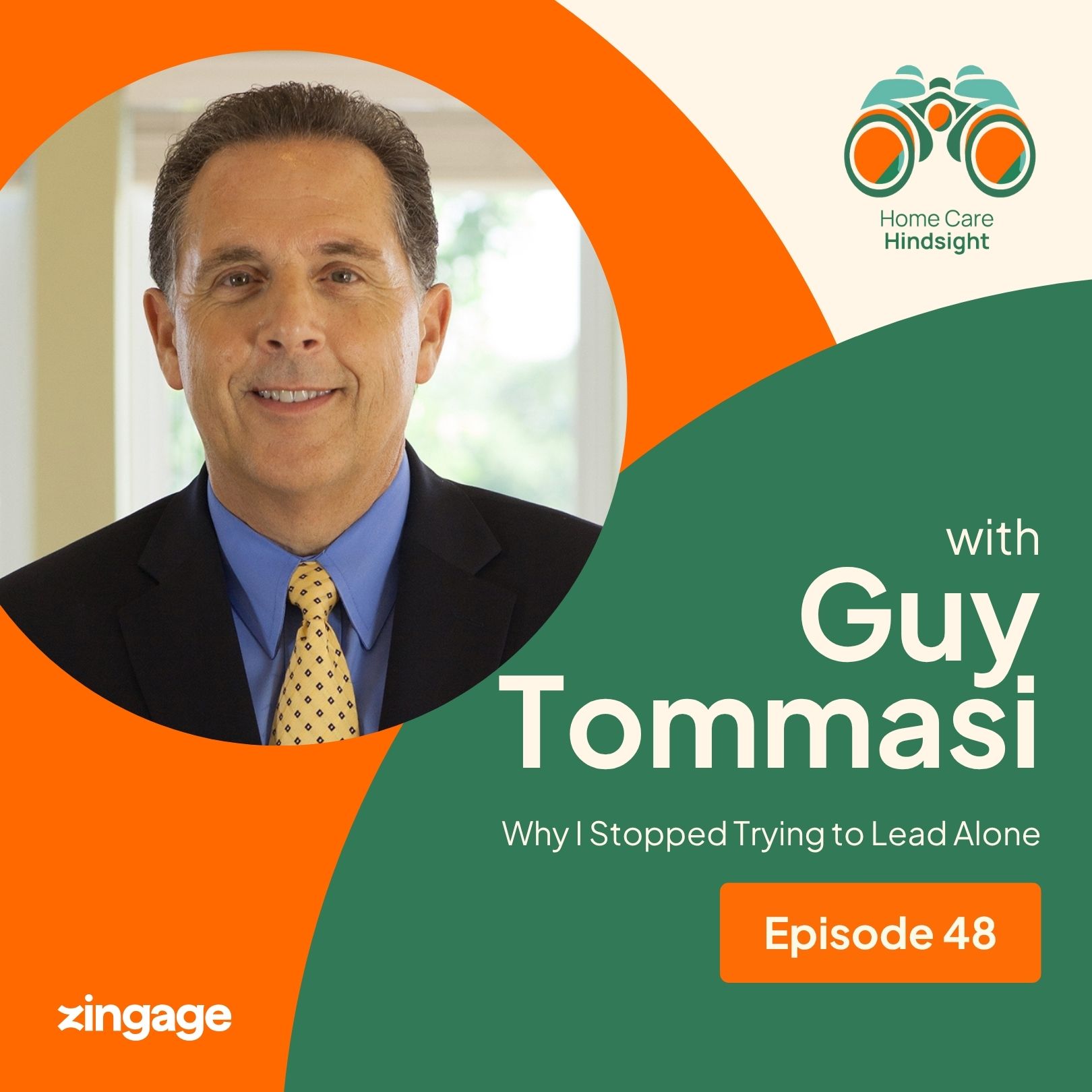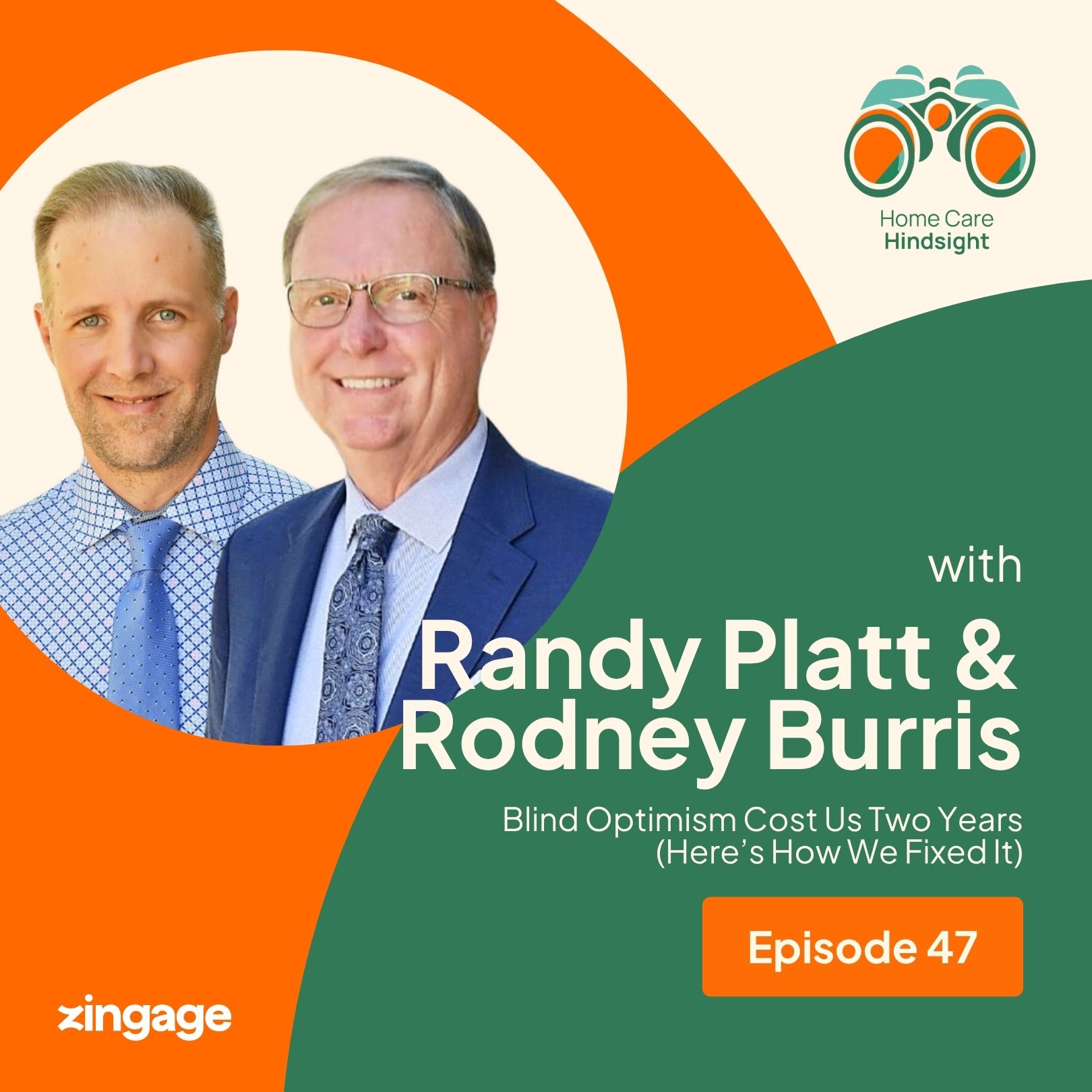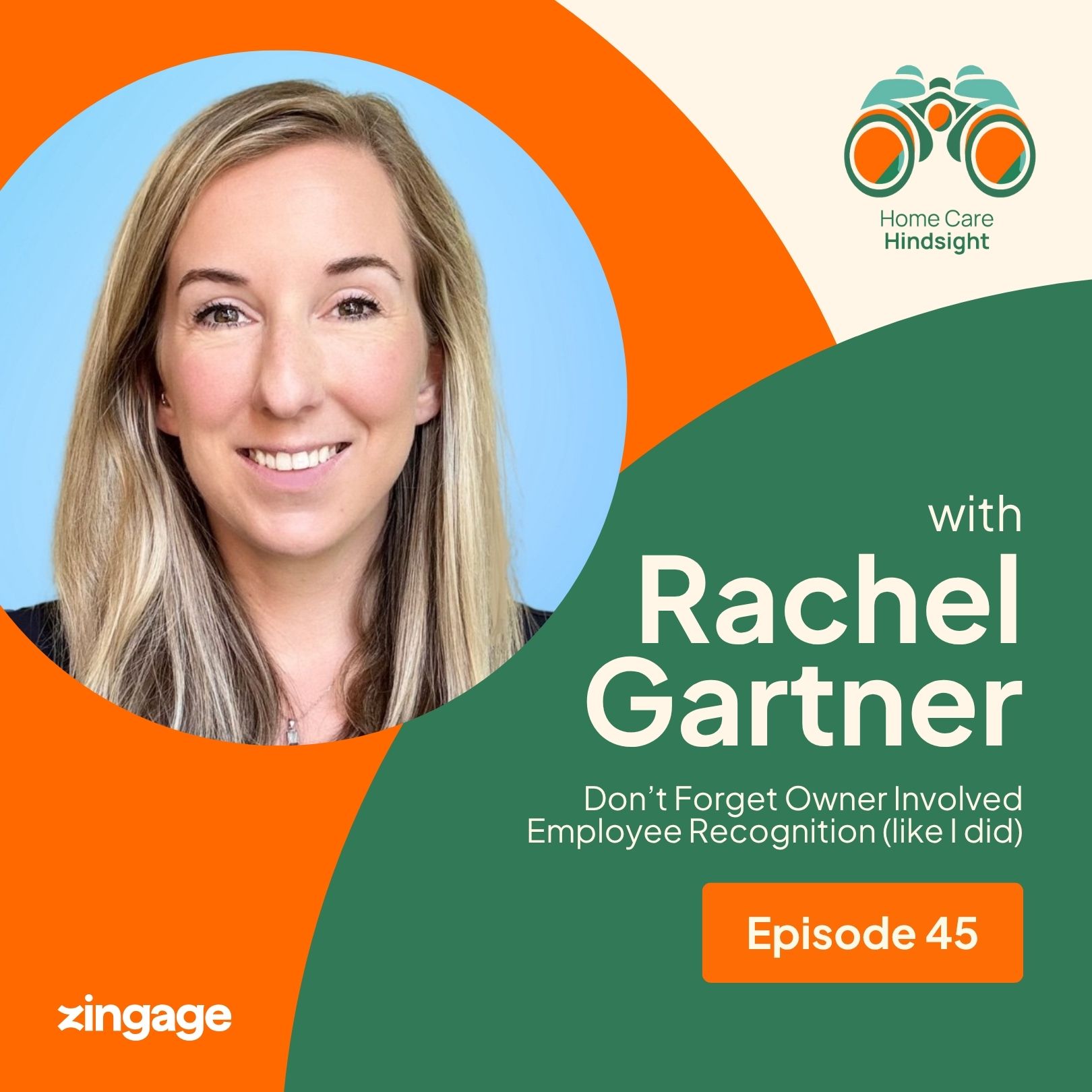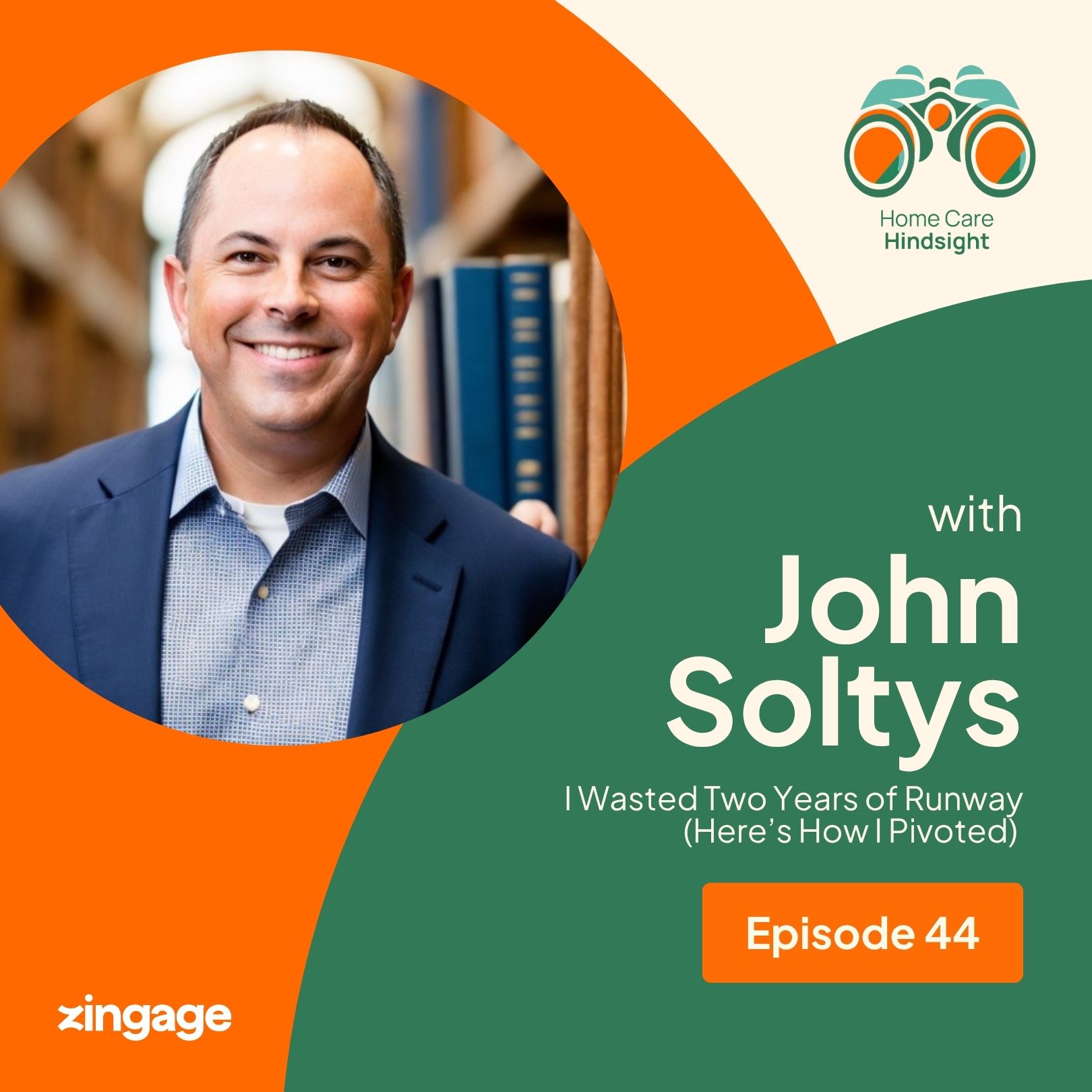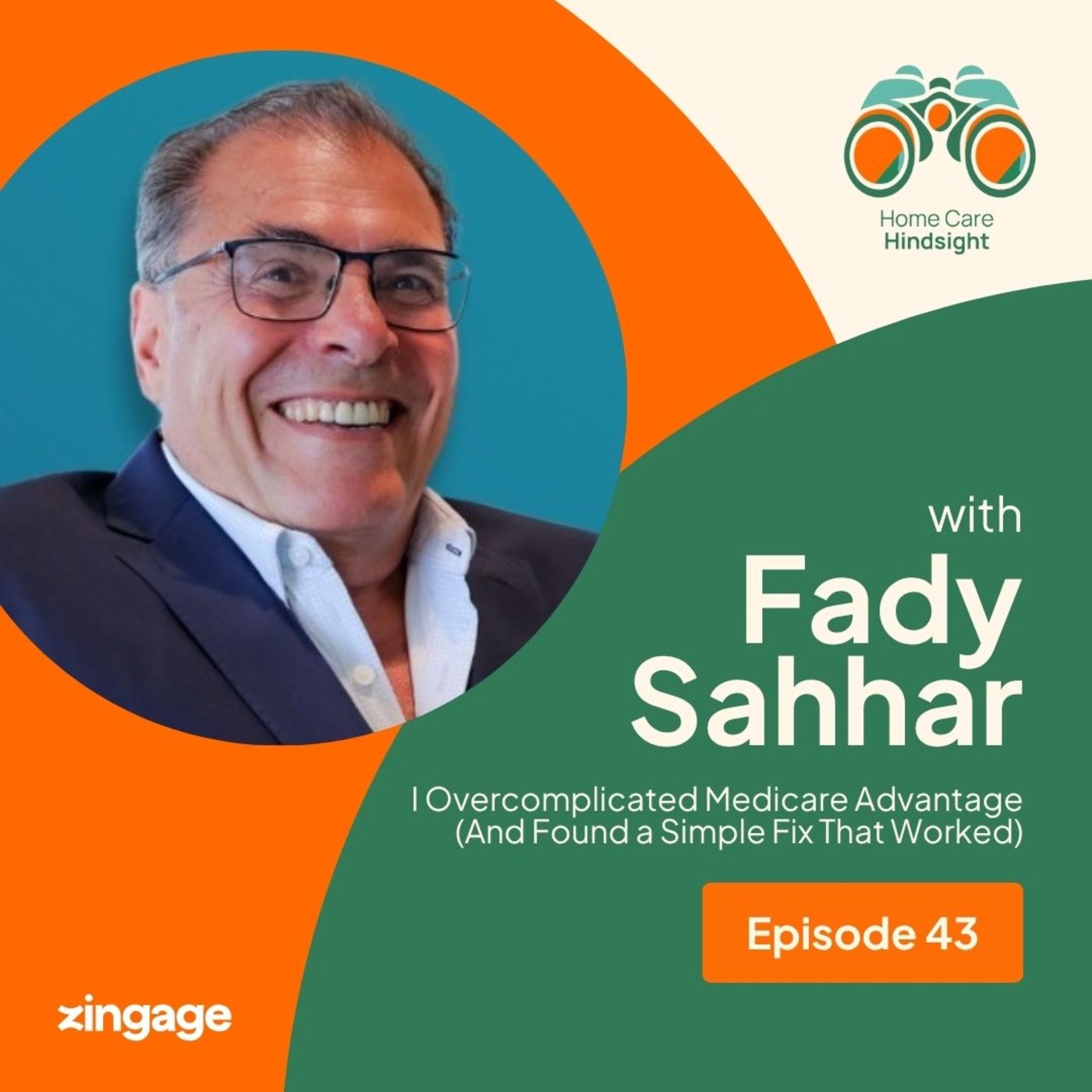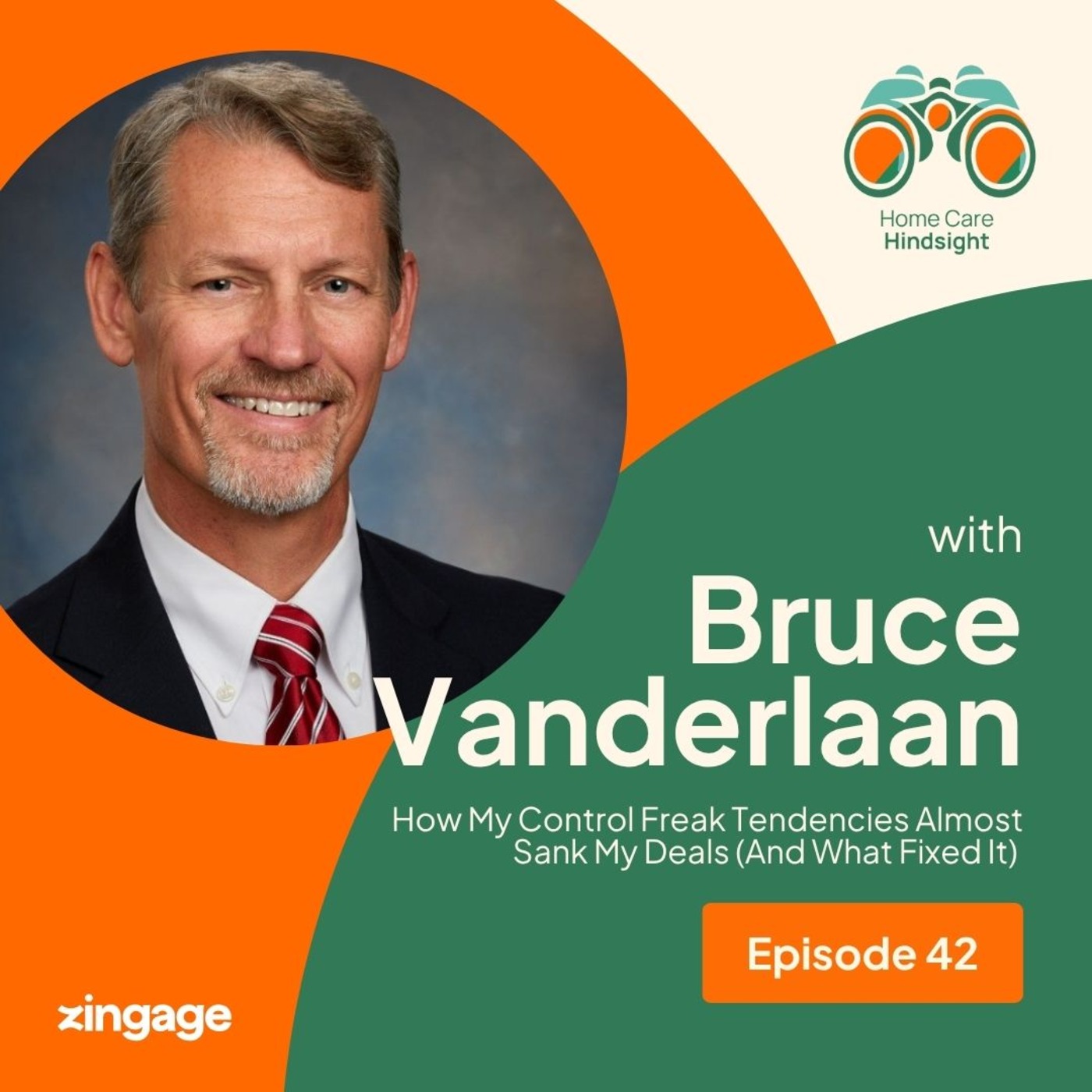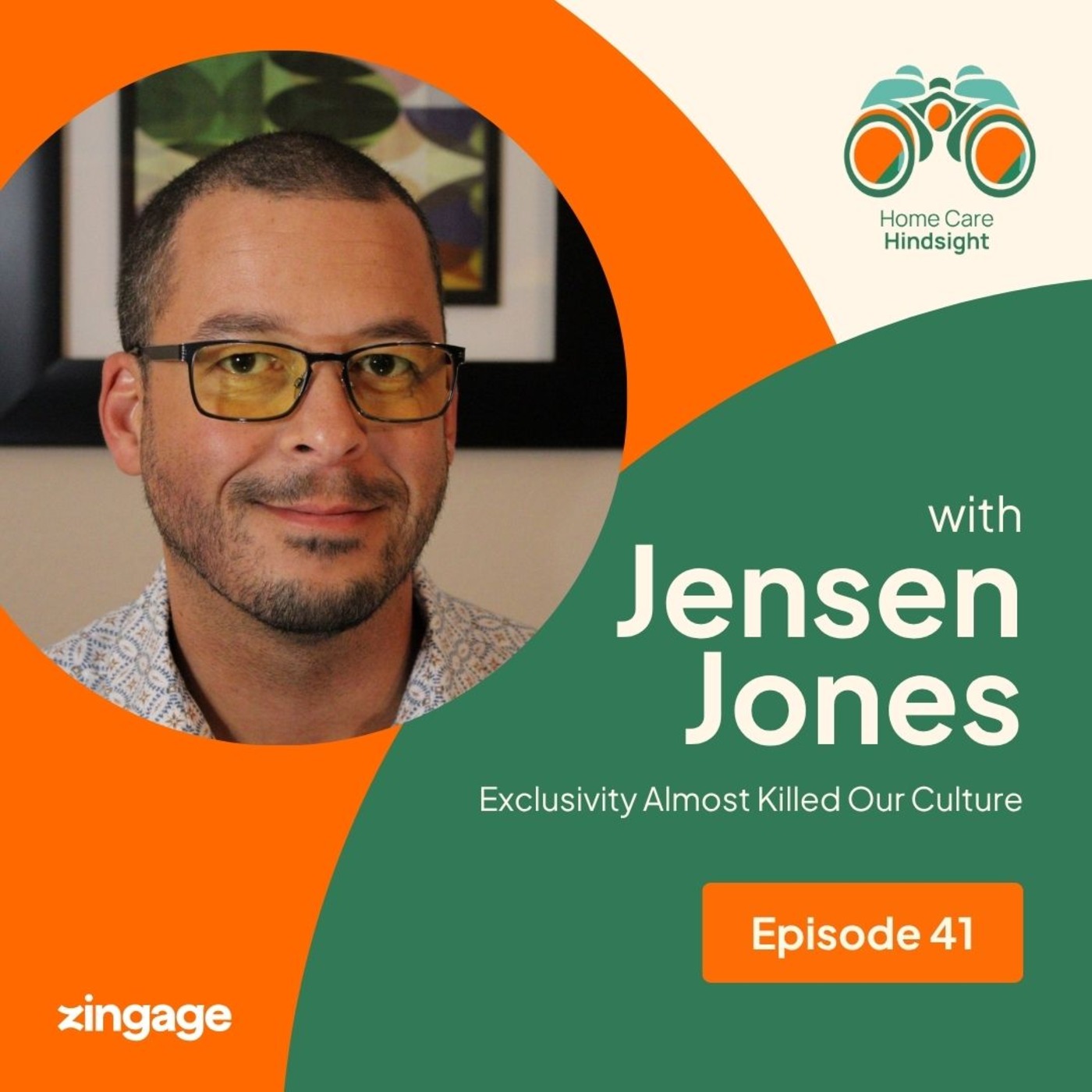Discover Home Care Hindsight
Home Care Hindsight

Home Care Hindsight
Author: David Knack
Subscribed: 5Played: 140Subscribe
Share
© David Knack 2024
Description
Welcome to Home Care Hindsight, where we dive deep into the lessons learned and strategies developed by home care providers to build a resilient and dedicated workforce. Powered by Ava, this podcast is your go-to resource for insights on retaining caregivers, reducing turnover, and optimizing your operations. Join us as we share real stories, expert advice, and practical tips that help you keep your caregivers happy and your business thriving.
60 Episodes
Reverse
Kevin Smith, CEO of Best of Care, joins host David Knack to pull back the curtain on a splashy but failed acquisition that taught him a brutal lesson about due diligence. Kevin opens up about buying an adult day health program's home care arm, a deal that made perfect sense on paper but fell apart at the seams, resulting in a massive revenue shortfall. He reflects on the costly mistake of relying too heavily on his relationship-driven "gut" for a process that required forensic analysis, and how the timing—closing the deal the day before his first child was born—added immense personal pressure. Kevin shares how this "abject failure" became the foundation for his subsequent successful acquisitions and offers hard-won wisdom on hiring, the trap of seeking the "perfect" candidate, and why the industry's obsession with the "10,000 hours per week" milestone is overrated. The discussion offers actionable advice on building a resilient, multi-service company that prioritizes its people. Lesson Takeaways: 1. Due Diligence Over Gut Feeling: A strategic acquisition requires meticulous, data-driven verification. Relying solely on a good relationship or a "vibe" can lead to catastrophic financial and operational failure. 2. Hire for Potential, Not Perfection: Letting the "perfect" candidate be the enemy of the "good" one leads to hiring paralysis. Often, the candidate with 80% of the skills but great potential outperforms the theoretical perfect fit. 3. Celebrate Milestones, But Keep Momentum: Industry benchmarks like "10,000 hours per week" are arbitrary. While it's good to celebrate wins, a true leader is always focused on the next strategic goal to maintain growth and morale. 4. Build a Culture That Supports Real Life: Fostering a company culture that actively supports employees' lives outside of work is a powerful driver of loyalty and retention. 5. Don't Over-Invest in Low-Impact Marketing: A functional website and basic presence are essential, but over-engineering brochures and web copy is a poor use of energy. Home care is a trust and relationship business; focus your efforts there. Timestamps: 00:00 - Introduction to Kevin Smith and Best of Care's 44-year history 02:45 - The synergy between Medicaid expertise and a private pay senior living model 08:12 - David's "big mistake" question: What went wrong? 08:37 - The story of the failed adult day health home care acquisition 10:15 - The perfect storm: Closing the deal the day before becoming a parent 11:01 - The aftermath: Retaining only 30% of the expected revenue 12:13 - The key lesson: Applying extreme due diligence to future, successful acquisitions 13:47 - Kevin's "gut feel" approach and when it fails 14:27 - Hiring mistakes: Why the 80% candidate often beats the 100% candidate 16:40 - The most overrated thing in home care: The "10,000 hours per week" milestone 19:32 - The next big goal: One million service hours 21:29 - The leadership challenge of always moving to "what's next" 22:41 - The reward of building a coaching tree and developing leaders from within 23:45 - How a millennial leadership team fosters a culture of work-life balance 25:13 - The little mistake: Overthinking your website and marketing materials 27:50 - A recent win: The successful integration of diversified service lines 29:04 - A deep dive into the move management business and its synergy with home care 32:08 - What to plug: Best of Care's holistic suite of services for senior living communities Quotes: Kevin Smith: "When you fail in life, that's how you learn. You don't learn when you win, you learn when you fail, and when you fail, fail hard. And we failed really hard on that." Kevin Smith: "The common denominator... is the lack of treating caregivers as family members of your company. They are the lifeline of your organization to grow." David Knack: "I have a hypothesis... you strike me as somebody who, gut is a really strong asset for you, that a lot of times you make decisions based on feel and it goes well." David Knack: "The purpose of a website is, does this business exist or not?... This is a relationship business. This is a trust business. This is a referral business." Resources: 1. Connect with Kevin Smith on LinkedIn: https://www.linkedin.com/in/kevin-smith-04755422/ 2. Learn more about Best of Care on their website: https://www.bestofcareinc.com/ 3. Connect with David Knack on LinkedIn: https://www.linkedin.com/in/david-knack/ 4. Powered by Zingage: https://zingage.com 5. Watch Episode on Zingage's YouTube: https://www.youtube.com/@Zingage
Gabrielle Pumpian returns, joined by death doula and end-of-life consultant Nicole Soares, for a profound conversation about the one thing every home care agency deals with but few are prepared for: death. They explore a common operational mistake: failing to align a caregiver's duties with a client's core values, leading to disengagement and a reduced schedule. Nicole shares her powerful personal journey that led her to become a "one-stop death shop," while Gabby reflects on the costly mindset of viewing a client's passing primarily as a revenue loss. The discussion offers actionable advice on preparing caregivers for end-of-life care, creating true partnerships with hospice, and building a company culture that sees death not as a failure, but as a sacred, honored part of life. Lesson Takeaways: 1. Align Care with Client Values, Not Just Tasks: A client's well-being is tied to their passions. Failing to connect care with what brings them joy can lead to client dissatisfaction and reduced hours. 2. Reframe Death from a Loss to an Honor: Shift the internal mindset from seeing a client's passing as a revenue hit to recognizing it as a sacred event your team is privileged to support. 3. Your Caregivers Need to Process Grief: Create safe spaces and rituals for caregivers to express emotion and process grief after a client dies. This is critical for their well-being and retention. 4. Forge Deep Partnerships, Not Shallow Referrals: A true partnership with hospice or a death doula involves joint training and shared values, not just exchanging business cards. 5. Identify and Empower Your "Death Liaison": Not everyone is comfortable with end-of-life conversations. Identify a team member who excels in this area and empower them to be the specialist and emotional support point person. Timestamps: 00:01 - Introduction to a unique episode on death, dying, and home care 02:18 - What is a death doula? Nicole Sos explains her role as a "one-stop death shop" 05:35 - David on America's death-averse culture and its link to senior loneliness 06:12 - Nicole's personal catalyst: The accident that put her in charge of her best friend's life-and-death decisions 09:41 - The critical gap in advanced directives: Why having a document doesn't guarantee your wishes are followed 13:45 - Gabby's challenge: Should home care agencies make advanced planning a standard part of their assessment? 17:08 - Gabby's journey from avoidance to leaning into conversations about mortality 21:00 - The "inconvenient truth": Confronting the gut reaction of revenue loss when a client passes 24:49 - Nicole's experience: When a hospice provider's policies conflict with a client's desire to end suffering 28:30 - How to practically and emotionally equip caregivers for a client's final days 31:47 - A powerful success story: Matching a client with a water aerobics-loving caregiver to restore joy and purpose 34:20 - Tapping into an untapped resource: Leveraging the cultural strengths of your caregiver team 35:15 - A simple, high-impact cultural practice: Implementing a daily 10-minute team meditation 37:51 - The power of ritual: Creating meaningful ways to honor clients who have passed away 43:00 - The non-negotiable: Creating safe spaces for caregivers to express emotion and process grief 44:44 - The leadership imperative: Framing end-of-life care as a gift and an honor, not a burden 46:30 - How to identify and empower a "death liaison" on your team to lead with heart and expertise Quotes: Nicole Soares: "I realized I could hold space for people that are dying and that I'm very deeply committed to helping people have good deaths... it was because I didn't get that when I needed it." Gabrielle Pumpian: "When you hear that you've lost two 24/7 clients... when you hear that two people have died, that makes it really difficult to then be able to support your caregivers. Ask them questions, pause, help them understand grief." Nicole Soares: "I really challenge caregivers and these home care companies to really look at what is a client's value and how do we align with that." David Knack: "What a gift that our people are in this business where they get to stand in the gap where family is not able to be there." Resources: 1. Connect with Gabrielle Pumpian on LinkedIn: https://www.linkedin.com/in/gpumpian/ 2. Connect with Nicole Soares on LinkedIn: https://www.linkedin.com/in/nicole-soares-420bb27/ 3. Learn more about Nicole's services on her website, Eco Love Transitions: https://www.ecolovetransitions.com/ 4. Connect with David Knack on LinkedIn: https://www.linkedin.com/in/david-knack/ 5. Powered by Zingage: https://zingage.com 6. Watch Episode on Zingage's YouTube: https://www.youtube.com/@Zingage
Gabrielle Pumpian returns, joined by death doula and end-of-life consultant Nicole Soares, for a profound conversation about the one thing every home care agency deals with but few are prepared for: death. They explore a common operational mistake: failing to align a caregiver's duties with a client's core values, leading to disengagement and a reduced schedule. Nicole shares her powerful personal journey that led her to become a "one-stop death shop," while Gabby reflects on the costly mindset of viewing a client's passing primarily as a revenue loss. The discussion offers actionable advice on preparing caregivers for end-of-life care, creating true partnerships with hospice, and building a company culture that sees death not as a failure, but as a sacred, honored part of life. Lesson Takeaways: 1. Align Care with Client Values, Not Just Tasks: A client's well-being is tied to their passions. Failing to connect care with what brings them joy can lead to client dissatisfaction and reduced hours. 2. Reframe Death from a Loss to an Honor: Shift the internal mindset from seeing a client's passing as a revenue hit to recognizing it as a sacred event your team is privileged to support. 3. Your Caregivers Need to Process Grief: Create safe spaces and rituals for caregivers to express emotion and process grief after a client dies. This is critical for their well-being and retention. 4. Forge Deep Partnerships, Not Shallow Referrals: A true partnership with hospice or a death doula involves joint training and shared values, not just exchanging business cards. 5. Identify and Empower Your "Death Liaison": Not everyone is comfortable with end-of-life conversations. Identify a team member who excels in this area and empower them to be the specialist and emotional support point person. Timestamps: 00:01 - Introduction to a unique episode on death, dying, and home care 02:18 - What is a death doula? Nicole Sos explains her role as a "one-stop death shop" 05:35 - David on America's death-averse culture and its link to senior loneliness 06:12 - Nicole's personal catalyst: The accident that put her in charge of her best friend's life-and-death decisions 09:41 - The critical gap in advanced directives: Why having a document doesn't guarantee your wishes are followed 13:45 - Gabby's challenge: Should home care agencies make advanced planning a standard part of their assessment? 17:08 - Gabby's journey from avoidance to leaning into conversations about mortality 21:00 - The "inconvenient truth": Confronting the gut reaction of revenue loss when a client passes 24:49 - Nicole's experience: When a hospice provider's policies conflict with a client's desire to end suffering 28:30 - How to practically and emotionally equip caregivers for a client's final days 31:47 - A powerful success story: Matching a client with a water aerobics-loving caregiver to restore joy and purpose 34:20 - Tapping into an untapped resource: Leveraging the cultural strengths of your caregiver team 35:15 - A simple, high-impact cultural practice: Implementing a daily 10-minute team meditation 37:51 - The power of ritual: Creating meaningful ways to honor clients who have passed away 43:00 - The non-negotiable: Creating safe spaces for caregivers to express emotion and process grief 44:44 - The leadership imperative: Framing end-of-life care as a gift and an honor, not a burden 46:30 - How to identify and empower a "death liaison" on your team to lead with heart and expertise Quotes: Nicole Soares: "I realized I could hold space for people that are dying and that I'm very deeply committed to helping people have good deaths... it was because I didn't get that when I needed it." Gabrielle Pumpian: "When you hear that you've lost two 24/7 clients... when you hear that two people have died, that makes it really difficult to then be able to support your caregivers. Ask them questions, pause, help them understand grief." Nicole Soares: "I really challenge caregivers and these home care companies to really look at what is a client's value and how do we align with that." David Knack: "What a gift that our people are in this business where they get to stand in the gap where family is not able to be there." Resources: 1. Connect with Gabrielle Pumpian on LinkedIn: https://www.linkedin.com/in/gpumpian/ 2. Connect with Nicole Soares on LinkedIn: https://www.linkedin.com/in/nicole-soares-420bb27/ 3. Learn more about Nicole's services on her website, Eco Love Transitions: https://www.ecolovetransitions.com/ 4. Connect with David Knack on LinkedIn: https://www.linkedin.com/in/david-knack/ 5. Powered by Zingage: https://zingage.com 6. Watch Episode on Zingage's YouTube: https://www.youtube.com/@Zingage
Victor Hunt, the passionate CEO and co-founder of Zingage, joins host David Knack for a long-awaited conversation. Victor opens up about the critical hiring mistake from his first startup: prioritizing raw technical skill over team cohesion and culture fit, a misstep that almost broke the company. He explains why this "Frankenstein's monster" approach to building a team fails and how it informed his "culture-first" philosophy at Zingage. Victor shares the only two traits he now looks for in every hire and dives into the underrated genius of home care owners, who are often overwhelmed by operational burdens instead of leveraging their deep expertise. The conversation also covers how to create "synthetic capacity" for your team, the power of focusing your energy on high-impact human connections (like in-person client introductions), and the simple mindset shift that can make your business and your life 10 times better. Lesson Takeaways: 1. Culture Over Credentials: A team of brilliant individuals who don't work well together will fail. Prioritize culture fit and shared mission over a flawless resume. 2. Hire for Care and Grit: The two non-negotiable traits for Zingage, and arguably for any home care business, are: genuinely caring about the mission, deep desire to win for the people who depend on you 3. Your Expertise is Underrated: Home care owners possess a deep, underappreciated understanding of the care continuum. The challenge isn't your knowledge; it's having the bandwidth to act on it consistently. 4. Automate the Tedious, Empower the Human: Use technology to offload administrative chores (scheduling, compliance, EVV tracking) so your best people can focus on what only they can do: build trust and create magical human connections. 5. Zoom Out to Your "Why": If you're constantly buried in details, you'll burn out. Regularly reconnect with your original "why." This reframes challenges and helps you deploy your energy on the most impactful activities, like nurturing referral partners and ensuring stellar client-caregiver relationships. Timestamps: 00:00 - The pressure of running a home care agency 01:16 - Introducing Victor Hunt, CEO of Zingage 02:45 - Victor's "passionate" reason for entering home care tech 04:12 - The story of the emergency call for a New Jersey agency 07:48 - David's "loaded question": What was your big mistake? 08:55 - The "Frankenstein's monster" mistake of hiring for skill, not culture 11:22 - The two essential traits Victor now hires for 13:07 - Why home care owners are smarter than they think 16:31 - The concept of "synthetic capacity" and getting leaner 19:54 - The most underrated thing in home care: the owner's expertise 22:15 - A simple, high-impact fix: Doing in-person introductions 24:38 - The little mistake that costs owners their energy 26:52 - Rapid fire: Letting your team take a workout class guilt-free 29:21 - Victor's recent win: Defining Zingage's culture manifesto 32:08 - What to plug: Zingage Operator for back-office relief 33:40 - Connect with Victor Hunt and work with Zingage Quotes: Victor Hunt: "We're not building Frankenstein's monster of a bunch of different appendages that all look nice independently, but don't really do well together." Victor Hunt: "If your whole team is burnt out... If they can't go and get a meal because they're taking three different calls... What are we doing here?" Victor Hunt: "The underrated aspect of this is that this is an industry that is extremely humane. These people have such deep expertise, and they underrate themselves." David Knack: "The cumulative impact of not having done [an in-person introduction] you can just start to see the degrading of trust between your clients and your caregivers and your staff." Resources: 1. Connect with Victor Hunt on LinkedIn: https://www.linkedin.com/in/victor-c-hunt/ 2. Connect with David Knack on LinkedIn: https://www.linkedin.com/in/david-knack/ 3. Powered by Zingage: https://zingage.com 4. Watch Episode on Zingage's YouTube: https://www.youtube.com/@Zingage
John "Moz" Mozdzien, a Navy veteran and co-founder of Veterans First, joins host David Knack to share a costly hiring mistake—but not of a person. He "hired" a flawed understanding of VA benefits, leading to a $10,000 loss on his company's very first case. He opens up about the specific rule regarding surviving spouses that they misunderstood and how this "hard fail" became the foundation for a 99.9% approval rate today. Moz reflects on how the crisis forged an unbreakable bond with his business partner, built on pre-existing trust. The conversation also covers the underrated power of genuine listening, the mission to serve veterans and their families, and why treating your caregivers like family is the ultimate key to growth. Lesson Takeaways: 1. Vet Your Assumptions, Not Just People: A hiring mistake can be about a flawed process or understanding. Always double-check the fine print, especially with complex systems like VA benefits. 2. Partnerships Are Forged in Failure: A business partnership built on pre-existing friendship and trust can withstand early, costly failures that would break other companies. 3. Fail Hard to Learn Hard: Your biggest, most expensive mistakes often contain the most valuable, business-defining lessons that pave the way for future success. 4. Your Caregivers Are Your Lifeline: The way you support, pay, and treat your caregivers is the single biggest indicator of your company's health and its ability to grow. 5. Listen More Than You Speak: Check your ego at the door. Surround yourself with people smarter than you and practice genuine listening to understand, not just to reply. Timestamps: 00:01 - Introduction of John "Moz" Mozdzien and his home care journey with Veterans First 02:28 - The mission of Veterans First and the overlooked "non-service connected pension" benefit 05:34 - Moz's big mistake: Misunderstanding a key VA rule, leading to a $10,000 loss 07:15 - The moment of realizing the error and the reaction from his business partner 08:14 - How a foundation of trust allowed the partnership to survive the failure 09:49 - Moz's philosophy on listening, ego, and filling a room with smarter people 14:11 - Underrated industry practice: Home care as a proactive service 16:02 - The critical role of companionship in combating loneliness 17:45 - A simple, high-impact tip: Conducting in-person caregiver-client introductions 19:27 - Going the extra mile: The power of visiting a hospitalized client 22:13 - The common little mistake: Failing to treat caregivers like family 26:07 - A story about building unwavering caregiver loyalty through trust 28:08 - Win of the week: Veterans First is expanding to Los Angeles 29:25 - Moz on overcoming imposter syndrome by focusing on others 30:45 - How to connect with Veterans First and what makes an ideal partner Quotes: John Mozdzien: "When you fail in life, that's how you learn. You don't learn when you win, you learn when you fail, and when you fail, fail hard. And we failed really hard on that." John Mozdzien: "If you fill a room with individuals that are smarter than you, you bring down egos and you listen more than you speak, incredible things happen." John Mozdzien: "The common denominator... is the lack of treating caregivers as family members of your company. They are the lifeline of your organization to grow." David Knack: "The little things are the everythings. An in-person introduction is an easy way to deliver value to everybody in the situation." Resources: 1. Veterans First: https://www.veteransfirst.us/ 2. Connect with John "Moz" Mozdzien on LinkedIn: https://www.linkedin.com/in/john-moz-mozdzien-8190823b/ 3. Connect with David Knack on LinkedIn: https://www.linkedin.com/in/david-knack/ 4. Powered by Zingage: https://zingage.com 5. Watch Episode on Zingage's YouTube: https://www.youtube.com/@Zingage
In this re-released episode of Home Care Hindsight, host David Knack sits down with Becky Reel, founder and CEO of Reel Home Care Consulting and former owner of a top-rated home care agency. In their conversation from 2024, Becky vulnerably shares the story of her biggest hiring mistake: bringing her nanny into the office during COVID-19. She details how she overlooked numerous red flags, which led to a toxic work environment and significant business disruption. From this experience, she learned invaluable lessons about the importance of thorough reference checks, truly listening to her team, and the critical difference between "checking in" and "checking on" your employees. The conversation also covers underrated business practices, such as the power of professionally responding to all online reviews, good and bad, to humanize your agency and build trust. Becky emphasizes that the key to caregiver retention isn't just money, but human connection and proactive support. Lesson Takeaways: 1. Dig Deeper When Hiring: Always conduct thorough reference checks, even for people you know personally. Pay attention to red flags in their work history and personal interactions. 2. Check On Your Team, Not Just In: Move beyond tactical updates in one-on-ones. Ask how your team is really doing and how they are getting along with colleagues to uncover issues early. 3. Humanize Your Business Online: Respond to all reviews—positive and negative. A professional, empathetic response to criticism can build more trust than a perfect 5-star rating. 4. Listen to the Cues: Caregiver turnover often has early warning signs. Proactively check on their needs, availability, and challenges instead of waiting for them to quit. 5. Plan Your Exit Early: If you want to sell your business someday, start planning years in advance. Brokers will want 3-5 years of solid growth data, so the time to build value is now. Timestamps: 00:00 - Introduction: Becky Reel's home care journey and successful exit 02:30 - Becky's current obsession: The emotional connection of live music 06:00 - The big mistake: Hiring her nanny and ignoring the red flags 09:45 - The aftermath: A toxic office environment and a hostile work environment claim 12:10 - Hindsight: The specific red flags that were missed 16:25 - The fixes: Improving reference checks and deepening one-on-ones 21:00 - Underrated Practice: The power of responding to online reviews 26:17 - A little mistake with a big impact: Not listening to caregiver cues 31:00 - Win of the Week: Helping a long-time agency owner step out of her comfort zone 33:45 - Home Care Hot Take: Overlooked referral sources, reducing turnover, and exit planning Quotes: Becky Reel: "I ignored so many red flags because I trusted her. But hiring someone you know personally isn't always the right move for your business." Becky Reel: "I truly believe the key to retention is humanizing what we're doing and connecting with our caregivers on a level that they feel supported." David Knack: "At the end of the day, home care is a people business. If you're not connecting with your team, it's going to hurt in the long run." Becky Reel: "If you care, if you have good customer service and you're doing this for the right reason, there is no reason why your agency would not be successful." Resources: 1. Reel Home Care Consulting: https://reelhomecareconsulting.com/ 2. Connect with Becky Reel on LinkedIn: https://www.linkedin.com/in/beckyreel 3. Connect with David Knack on LinkedIn: https://www.linkedin.com/in/david-knack/ 4. Powered by Zingage: https://zingage.com 5. Watch Episode on Zingage's YouTube: https://www.youtube.com/@Zingage
In this returning episode of Home Care Hindsight, host David Knack is joined by Steve "The Hurricane" Weiss, founder of Home Care Evolution. Together, they dive into how home care agencies can finish 2025 strong and hit the ground running in 2026. Steve emphasizes the importance of using September–October to audit your business, tighten referral relationships, and prepare for seasonal surges (like elective surgeries leading to more home care referrals). He shares how to create an orthopedic specialty program to stand out from competitors and walks through the patient journey for better outcomes and higher revenue. The conversation shifts to goal setting, with Steve explaining the difference between bad (vague) goals and SMART, measurable ones — including a real-world success story of a client who achieved a 50/50 payer mix and increased billable hours by 20%. Finally, Steve and David discuss how to grow VA service lines responsibly, avoid overreliance on government payers, and improve caregiver retention by focusing on higher-hour "total care" clients. Lesson Takeaways: 1. Plan Now, Not in January: The best time to plan for 2026 is now. Use October to audit your last 12 months, set SMART goals, and identify the tools and support you'll need to hit them. 2. Focus on Total-Care Clients: Caregiver retention improves when you prioritize clients with 40+ hours per week. This creates stable, full-time work that caregivers stay for. 3. Be "Five-Mile Famous": You don't need a huge marketing budget—just consistent local presence. Network weekly, host lunch-and-learns, and build referral relationships within your community. 4. Morale Matters: Invest in your office team with regular morale-building activities. A strong internal culture trickles down to caregivers and clients. 5. Decide and Execute: Indecision is a growth killer. Research, sleep on it, then commit—even a wrong decision is better than no decision at all. Timestamps: 00:00 - Introduction: Steve "The Hurricane" Weiss returns to the show 02:30 - The summer slump is over: How to hit the ground running this fall 05:00 - The Q4 opportunity: Why elective surgeries spike and how to prepare 07:15 - Building a specialty program for orthopedic patients 09:45 - The caregiver's role: From PT appointments to at-home exercises 12:10 - Steve's planning mantra: Why you should plan for 2026 now 16:25 - A lesson from the UK: The power of diversifying your payer mix 19:15 - Growing your VA line wisely (and why 20% is the sweet spot) 22:05 - The caregiver retention secret: Focus on "total-care" clients 26:30 - Advice for new owners stuck in the recruitment/scheduling cycle 31:00 - How to be "Five-Mile Famous" in your local market 33:45 - An inspiring client story: Scaling after two heart attacks 38:10 - The "hot list" system for keeping caregivers engaged 41:00 - The office culture fix: Why morale-building is non-negotiable 42:15 - The #1 thing holding owners back: Indecisiveness 43:50 - Steve's win: Invitation to the Home Care Millionaires Bootcamp Quotes: Steve Weiss: "You can recover from a wrong decision, but you'll never recover—and you'll never grow—if you don't make a decision at all." Steve Weiss: "Be five-mile famous. You don't need to know everyone in the world—just everyone who can send you a patient." David Knack: "You've got to create a little FOMO with your caregivers. Share the success others are having so they want to be next." Steve Weiss: "If you want to grow strong, make sure your office staff culture is strong. It trickles down to everyone." Resources: 1. Home Care Evolution: https://homecareevolution.com/ 2. Connect with Steve "The Hurricane" Weiss on LinkedIn: https://www.linkedin.com/in/steve-hurricane-weiss-13996b2/ 3. Connect with David Knack on LinkedIn: https://www.linkedin.com/in/david-knack/ 4. Powered by Zingage: https://zingage.com 5. Watch Episode on Zingage's YouTube: https://www.youtube.com/@Zingage 6. Home Care Millionaires Bootcamp (Houston, Nov 19-21): https://homecareevolution.com/houston-2025-boot-camp-page/
In this episode of Home Care Hindsight, host David Knack is joined by Clayton Foutch, a home care veteran and founder with over 18 years in the industry. Clay opens up about the costly mistake of stubbornly pursuing a major partnership that was a poor strategic fit for his company's "Four Seasons" vision. He shares how his refusal to listen to his team and cut losses earlier resulted in a significant financial and reputational hit. Clay also dives into the importance of revenue diversification for stability, the collaborative nature of the home care industry, and how to thoughtfully integrate new technology without losing sight of your core mission: serving caregivers and clients. Lesson Takeaways: 1. Know Your "Lemon Meringue": Identify your core business which is the thing you do best, and avoid cluttering it with distracting "knick-knacks" (like ill-fitting partnerships) that drain resources. 2. Diversify Your Revenue Streams Early: Relying on a single referral source (like skilled nursing facilities) makes your business vulnerable. Explore concierge care, veterans' programs, and other payer mixes before a crisis forces you to. 3. Surround Yourself with Contrarians: Your biggest weakness might be your own stubbornness. Build a team of trusted, objective advisors (like Clay's partner Jeff) who aren't afraid to tell you when your "kid is ugly." 4. Embrace Mistakes as Tuition: View business missteps not as failures, but as paid education. This mindset shift allows for quicker pivots and reduces the emotional cost of being wrong. 5. Lead with Humility Through Change: When implementing new technology or processes, be honest with your team that you don't have all the answers. Frame it as a collaborative journey to better serve clients and caregivers, and be willing to backtrack if you take a wrong turn. Timestamps: 00:00 - Introduction and Clay's background in home care 04:30 - The story of the "Australian pirate" secret shopper call 11:10 - Clay's biggest mistake: The stubborn pursuit of a costly, misaligned partnership 16:45 - The "Lemon Meringue" lesson from The Profit that sparked a pivot 20:15 - How to evaluate partnerships against your core mission and values 25:30 - Underrated or Overrated? Balancing tech innovation with the human element of care 33:00 - The critical need for revenue diversification (and the mistake of not having it) 39:00 - A small mistake owners make: Trying to do everything themselves instead of delegating 43:30 - What Clay is most excited about now: Mentoring other entrepreneurs in the franchise network 46:45 - The importance of finding mentors and building a personal "board of directors" 51:20 - Clayton shares two of his recent successes and the reason behind them Quotes: Clay: "I get so dug in on maybe not being wrong that I just kept persevering and persevering on trying to make this work... It cost us a ton of money, really reputation." Clay: "Having some diversification in revenue is really important because things do change. My entire business was built on walking into skilled nursing facilities... and then in one minute that ended." Clay: "I'm not afraid to just say like, I don't know. I'm not afraid to say I need help. I think when you share that with your team... you can genuinely be humble." David Knack: "We don't have good change management muscles in this industry... because we move so fast every day, reacting and putting out fires." Resources: 1. Home Matters Caregiving: https://homematters.com/ 2. Connect with Clayton Foutch on LinkedIn: https://www.linkedin.com/in/clayton-foutch 3. Connect with David Knack on LinkedIn: https://www.linkedin.com/in/david-knack/ 4. Powered by Zingage: https://zingage.com 5. Watch Episode on Zingage's YouTube: https://www.youtube.com/@Zingage
In this episode of Home Care Hindsight, host David Knack is joined by Steven Gonzales, CEO of HealthView Home Health & Hospice, to demystify the world of home health. Steven breaks down the core function of home health, its role in the care continuum post-hospital discharge, and the critical financial challenges driven by payer mix and Medicare Advantage. He shares invaluable insights on how home care agencies can become essential partners by understanding clinical needs, tracking client payer data, and focusing on true care coordination. Steven also looks to the future, discussing the exciting potential of AI and personalized medicine to transform patient outcomes and free up caregivers to focus on human connection. Lesson Takeaways: 1. Home Health's Core Role: The primary goal is to help patients recover after a hospital discharge through skilled nursing and therapy, with success measured by preventing rehospitalizations. 2. Payer Mix is Everything: The biggest challenge isn't getting referrals—it's profitability. Declining reimbursement rates, especially from Medicare Advantage plans, force agencies to be highly selective about which patients they can accept without losing money. 3. Become a Data-Driven Partner: Home care agencies can stand out by tracking their clients' insurance (payer mix) and proactively presenting this data to potential home health partners to see if a business relationship is even feasible. 4. You Are the Eyes and Ears: Non-medical home care is a powerful tool for preventing hospitalizations. The key is to be "woven into the care plan" and act as an early warning system for changes in condition, communicating effectively with clinical partners. 5. The Future is Personalized: Advancements in AI and technology will lead to more personalized medicine and customized software solutions, freeing up professionals to focus on the human elements of care and coordination. Timestamps: 00:00 - Introduction to the "Home Health 101" series and Steven Gonzales 02:30 - Steven's journey from non-medical home care to leading a post-acute continuum company 05:00 - How HealthView differentiates itself through culture in a competitive nursing market 09:15 - The day-to-day of home health: Who gets referred, from where, and why 12:45 - The real challenge: It's a payer mix problem, not a referral problem 18:20 - Why Medicare Advantage plans are squeezing home health margins 22:30 - The metrics that matter: Hospitalization, rehospitalization, and proving value to health systems 28:50 - The critical gap home care can fill in the care continuum 33:40 - How home care providers should approach partnerships with data in hand 38:00 - The exciting future of personalized medicine and AI in home-based care Quotes: Steven Gonzales: "There's such a demand for home health... but it's not a referral problem, it's really a payer mix problem." Steven Gonzales: "Home care [is] such a pivotal part of preventing hospitalizations as long as... they're weaved into the care plan. They're the eyes and ears." David Knack: "Something to give is something that... takes very little extra work. Just make it part of the intake process." Steven Gonzales: "The reason computers were built was for us to go do life... Freeing up people's time so they can... do the human stuff really well is what I think is pretty cool." Resources: 1. HealthView Home Health & Hospice: https://healthviewhomehealth.com/ 2. Connect with Steven Gonzales on LinkedIn: https://www.linkedin.com/in/stevegonzalez/ 3. Connect with David Knack on LinkedIn: https://www.linkedin.com/in/david-knack/ 4. Powered by Zingage: https://zingage.com 5. Watch Episode on Zingage's YouTube: https://www.youtube.com/@Zingage
In this episode of Home Care Hindsight, host David Knack welcomes Gregg Mazza, former home care agency owner and current coach to home care entrepreneurs. Gregg shares his journey from building a successful agency from scratch to selling it and now helping other owners avoid the pitfalls he experienced. He opens up about his biggest mistake: hiring seven salespeople who failed before he finally cracked the code on building a sales team that drives growth. Gregg emphasizes the importance of hiring for traits over industry experience, implementing clear systems, and holding teams accountable. He also discusses the dangers of "no-one-can-do-it-better-than-me-itis" and how empowering your team can free you to focus on strategic growth. Lesson Takeaways: 1. Hire for Traits, Not Just Experience: Look for drive, resilience, and heart—these are often more important than industry background. 2. Build Systems, Not Dependencies: Document your sales and operational processes so anyone can step in and succeed. 3. Delegate to Scale: You can't grow if you're the bottleneck. Trust your team, empower them, and hold them accountable. 4. Let Go of Perfection: Good enough often is. Focus on progress, not perfection, and build feedback loops to maintain quality. 5. Trust Your Gut: If a hire isn't working, don't wait. Cut ties early to save time, money, and stress. Timestamps: 00:00 - Introduction to Gregg Mazza 02:00 - Gregg's journey from home care owner to coach 07:20 - The burnout trap: Why owners get stuck in the weeds 11:30 - The sales hiring nightmare: 7 fails before success 18:40 - The 3 keys to sales hiring: Right person, system, accountability 22:15 - Why "good customer service" isn't a differentiator 27:50 - The disease of "I can do it better myself" 32:10 - How to break the open-door policy habit 36:45 - Gregg's win: Trusting his gut to fire fast 40:00 - Plug: Gregg's mastermind group for growth-minded owners Quotes: Gregg Mazza: "I hired 7 salespeople who failed before I got it right. I wasted over $200,000—but I didn't give up." David Knack: "If you're the bottleneck, you can't scale. It's that simple." Gregg Mazza: "Hire the hunter with a heart. Drive and compassion aren't mutually exclusive." Gregg Mazza: "No-one-can-do-it-better-than-me-itis is a rampant disease in small business. It will keep you stuck." Resources: 1. Gregg Mazza's Mastermind Group: https://homecarebreakthrough.com/ 2. Connect with Gregg Mazza on LinkedIn: https://www.linkedin.com/in/gregg-mazza 3. Connect with David Knack on LinkedIn: https://www.linkedin.com/in/david-knack 4. Powered by Zingage: https://zingage.com 5. Watch Episode on Zingage's YouTube: https://www.youtube.com/@Zingage
In this episode of Home Care Hindsight, host David Knack sits down with Lucas Carroll, CEO of The Business of Senior Care. Lucas specializes in guiding home care startups, change of ownerships, and expansions through the complex world of state licensing and compliance. He shares his unexpected journey from law school dropout to becoming a key resource in the home care industry. Lucas dives into a significant opportunity for agencies: diversifying into private duty nursing to retain clients, offer premium services, and increase revenue. He also emphasizes the profound value of building relationships, even with competitors, and the importance of seeking mentorship from those just a few years ahead in their journey. Lesson Takeaways: 1. Explore Private Duty Nursing: There's a growing niche between non-medical home care and full home health. Offering services like medication setup, injections, or wound care privately can be a significant revenue driver and client retention tool. 2. Your Network is a Lifeline: Actively build relationships with other agency owners. They can be collaborators, not just competitors, providing support when you're short-staffed or need advice. 3. Leverage Your Experience: Don't overlook starting a business in the industry you know best. Your existing knowledge and network are invaluable assets. 4. Delegate to Accelerate: The biggest bottleneck for many owners is trying to do everything themselves. Identify the highest and best use of your time (often sales and marketing) and delegate or outsource the rest. 5. Learn from Those Ahead: Find mentors who are 2-3 years ahead of you. Their recent mistakes and lessons learned are a shortcut to avoiding frustration and saving time and energy. Timestamps: 00:00 - Welcome to Home Care Hindsight 02:12 - Introduction to Lucas Carroll and The Business of Senior Care 02:41 - Diversifying service lines and payer sources 03:59 - The opportunity in private duty nursing 07:40 - Lucas on being a middle child and his personality 09:22 - The big mistake: Not leveraging his home care experience sooner 12:14 - The moment the idea clicked: A call from the health department 14:59 - The emotional journey of a new home care owner 17:08 - The entrepreneur's constant doubt: "Have I made a mistake?" 18:46 - The most underrated thing in home care: Relationship building 22:53 - A small mistake with big impact: Trying to do everything yourself 26:28 - A recent win: Helping agencies expand into private duty nursing Quotes: Lucas Carroll: "If you can talk to somebody who's two to three years ahead of where you want to be... they usually are like, man, I made so many mistakes. I would do this... and you just save yourself frustration, time, energy." Lucas Carroll: "Why can't I leverage the experience and expertise and the mentors and the knowledge that I gained throughout this home care journey?" Lucas Carroll: "The true value [is] in relationship building in the industry... developing relationships with other home care agencies who could be considered competitors." David Knack: "Home care does not attract people who are looking to delegate by virtue of who they are as people... The buck stops with me. I'm gonna take care of it." Resources: 1. The Business of Senior Care: https://thebusinessofseniorcare.com/ 2. The Business of Senior Care on LinkedIn: https://www.linkedin.com/company/the-business-of-senior-care/ 3. Lucas Carroll on LinkedIn: https://www.linkedin.com/in/lucascarroll/ 4. Connect with David Knack on LinkedIn: https://www.linkedin.com/in/david-knack/ 5. Connect with Zingage on LinkedIn: https://www.linkedin.com/company/zingage/ 6. Powered by Zingage: https://zingage.com/ 7. Watch Episode on Zingage's YouTube: https://www.youtube.com/@Zingage
In this episode of Home Care Hindsight, host David Knack welcomes Chuck Bailey, founder and CEO of True North Holdings, to discuss the realities of being a small business owner in the home care industry. With decades of experience as a corporate executive, franchisee, franchisor, and now a service provider to franchisees, Chuck shares invaluable insights on the challenges of entrepreneurship, the importance of financial discipline, and the two critical roles every business owner must master: driving revenue and building a team. He also reflects on his biggest mistake: trying to control everything, and how learning to delegate and trust his team transformed his business. Lesson Takeaways: 1. The Two Core Responsibilities of an Owner: Focus on driving revenue and building your team. Everything else can be delegated or outsourced. 2. Avoid Overcontrol: Holding onto tasks too tightly limits growth. Delegate early and trust your team to execute, even if their methods differ from yours. 3. Financial Cadence is Key: Regularly review your finances, regardless of whether you're struggling or thriving. Consistency in financial oversight prevents surprises and fuels growth. 4. Hire for Vision Alignment: Prioritize hiring bright, adaptable people who understand and embody your mission, rather than just industry experience. 5. AI as a Tool, Not a Miracle: While AI can enhance consistency and efficiency, it requires training and alignment with your business's core values to be effective. Timestamps: 02:24 - The challenges of being a small business owner in home care 07:25 - Chuck's biggest mistake: Trying to control everything 12:44 - The importance of mission and vision in team building 19:18 - Financial cadence: Why it's critical for business success 24:41 - Overrated in home care: Exotic marketing solutions 29:50 - The role of AI in home care and maintaining message consistency 34:31 - A small mistake with big consequences: Delegating sales too soon 40:41 - Chuck's win of the week: Launching My Franchise Bookkeeper Quotes: Chuck Bailey: "The two jobs of a business owner are to drive revenue and build the team. Everything else can be outsourced." David Knack: "The rub of leadership is holding the vision tightly but the execution loosely." Chuck Bailey: "People buy from people who care. That's the foundation of home care." Chuck Bailey: "80% of AI is crap. The 20% that works can change your business—if you train it right." Resources: 1. Chuck Bailey on LinkedIn: https://www.linkedin.com/in/charlesbailey/ 2. True North Holdings on LinkedIn: https://www.linkedin.com/company/true-north-holdings/ 3. True North Holdings website: https://www.true-north-holdings.com/ 4. My Franchise Bookkeeper: https://www.linkedin.com/company/myfranchisebookkeeper/ 5. Connect with David Knack on LinkedIn: https://www.linkedin.com/in/david-knack/ 6. Connect with Zingage on LinkedIn: https://www.linkedin.com/company/zingage/ 7. Powered by Zingage: https://zingage.com/ 8. Watch Episode on Zingage's YouTube: https://www.youtube.com/@Zingage
In this episode of Home Care Hindsight, host David Knack sits down with Emily Isbell, founder of EI and Company, to discuss her impressive journey from caregiver at 19 to a successful home care consultant and bestselling author. They talk about Emily's early career, the evolution of her business, and the release of her book, 'The 24/7 Solution.' Emily shares valuable insights on correcting mistakes, the importance of consistently executing strategies, and the necessity of looking for talent within your existing workforce. They also explore the challenges of maintaining emotional maturity in a high-stakes industry like home care. Lesson Takeaways: 1. When mistakes happen, own them, apologize, and work to make things right rather than focusing on defending your actions. 2. Stick to your systems and execute consistently, even when challenges arise. This is essential for long-term success. 3. Look for leadership potential in your caregivers. With the right mentorship, they can become powerful contributors to your business. 4. Base your decisions on hard data, not emotional reactions, to ensure sustainable growth and success. Timestamps: 00:00 - Introduction to Emily Isbell and her home care journey 04:29 - Emily's "What if?" career: Owning a gym for competitive gymnastics 07:34 - The cigarette mistake: A cringe-worthy moment from Emily's caregiving days 13:00 - Emily's key takeaway: "It's about making right, not being right" 16:37 - The importance of consistent execution in the home care industry 25:00 - Promoting from within: Emily's philosophy on caregiver development 34:31 - Big vs. small mistakes: Thinking like an owner, not a manager 40:41 - Emily's win of the week: Growing client businesses by 60% in six months Quotes: Emily Isbell: "It's not about being right; it's about making right. That's how you build trust in this industry." David Knack: "An urgent problem in home care is also an important one, which makes it crucial to respond with emotional maturity." Emily Isbell: "I would not be here today if someone hadn't believed in promoting caregivers from within." Emily Isbell: "Data over dopamine—that's how we keep the business growing without being reactive to every little challenge." Resources: 1. Emily Isbell on LinkedIn: https://www.linkedin.com/in/emilyisbellcofounder/ 2. Emily's Book: The 24/7 Solution: Proven Strategies for Home Care Business Leaders: https://www.amazon.com/24-Solution-Strategies-Business-Leaders/dp/B0D35QD7HT 3. EI and Company: https://emilyisbellco.com/ 4. EI and Company on LinkedIn: https://www.linkedin.com/company/emilyisbellco/about/ 5. Connect with David Knack on LinkedIn: https://www.linkedin.com/in/david-knack/ 6. Connect with Zingage on LinkedIn: https://www.linkedin.com/company/zingage/ 7. Powered by Zingage: https://zingage.com/ 8. Watch Episode on Zingage's YouTube: https://www.youtube.com/@Zingage
In this episode of Home Care Hindsight, host David Knack welcomes Guy Tommasi, a seasoned leader in the home care industry with over 25 years of experience. Guy shares his journey from hospital care to pioneering innovative, data-driven strategies in non-medical home care. He takes us to a discussion of the importance of differentiating your agency by aligning with stakeholders' needs, leveraging data to demonstrate outcomes, and the pitfalls of overemphasizing "scaling" as a measure of success. Guy also highlights the transformative power of collaboration, both within teams and with clinical partners, and why home care agencies should seize opportunities in higher-acuity care. Lesson Takeaways: 1. Success is Defined by You: Don't let external benchmarks like "scaling" dictate your agency's success. Focus on what aligns with your goals and values. 2. Speak Your Stakeholders' Language: To stand out in a competitive market, translate your services into outcomes that matter to referral sources, such as reduced hospital readmissions and improved patient satisfaction. 3. Empower Your Team: Leadership isn't about making all the decisions—it's about involving your team, fostering ownership, and trusting them to drive innovation. 4. Don't Assume Clinical Programs Aren't for You: Non-medical home care agencies can play a critical role in value-based care and hospital-at-home programs. Challenge assumptions and explore new revenue streams. Timestamps: 00:00 - Welcome to Home Care Hindsight 02:10 - The competitive landscape of Connecticut's home care market 04:35 - How data became a differentiator for Guy's agency 08:28 - The power of speaking stakeholders' language 12:19 - Overcoming the "private pay" objection with referral sources 16:39 - Guy's "Neuralizer" moment: The 2004 Yankees-Red Sox World Series 19:48 - The big mistake: Trying to lead alone instead of empowering the team 25:00 - A team success story: How a supervisor transformed their data program 29:47 - Why "scaling" is overrated in home care 33:25 - The problem with calling caregivers "unskilled" 36:24 - The mistake of leaving clinical opportunities on the table 42:10 - Guy's proudest moment: Helping an agency join a hospital-at-home program 45:00 - Final plug: Home care's strategic role in the future of healthcare Quotes: Guy Tommasi: "Success is what you feel it is. Don't let the word 'scale' intimidate you or dictate whether you're successful or not." David Knack: "An urgent problem in home care is also an important one, which makes it crucial to respond with emotional maturity." Guy Tommasi: "Don't assume because something is 'clinical' that it's not for you. 80% of health outcomes are non-medical—that's our space." Guy Tommasi: "Leadership isn't about dragging people along—it's about directing their energy and letting them own the results." Resources: 1. Guy Tommasi on LinkedIn: https://www.linkedin.com/in/guy-tommasi-a0a4bb18/ 2. Corcoran Consulting Group LLC: https://www.corcoranconsultants.com/ 3. Corcoran Consulting Group LLC on LinkedIn: https://www.linkedin.com/company/corcoranconsultinggroup-llc/ 4. Connect with David Knack on LinkedIn: https://www.linkedin.com/in/david-knack/ 5. Connect with Zingage on LinkedIn: https://www.linkedin.com/company/zingage/ 6. Powered by Zingage: https://zingage.com/ 7. Watch Episode on Zingage's YouTube: https://www.youtube.com/@Zingage
Randy Platt and Rodney Burris, co-founders of Care Partners, reveal how blind optimism and over-reliance on culture nearly derailed their home care startup, and the pivotal shifts that turned their $0M mistake into 40% growth. In this transparent conversation, the duo unpacks their early missteps: from chasing unrealistic budgets to hiring for "culture fit" over performance. Discover how they transformed their partnership through radical transparency ("no barnacles"), why EQ now trumps IQ in their hiring, and the surprising metric that proves their team's resilience. From solving healthcare fragmentation to measuring the unmeasurable (like caregiver impact on family stress), Randy and Rodney share hard-won lessons on building a company where love, empathy, and execution coexist. In This Episode, You'll Discover: 1. The $0M mistake: How Rodney's blind optimism burned 30 months of runway (and the team hack that fixed it). 2. Culture vs. performance: Why Randy's "over-architected" hiring approach backfired—and the balance that works now. 3. The "no barnacles" rule: How radical partnership transparency prevents startup collapse. 4. EQ > IQ: Why they hire passionate novices over jaded experts. 50 The unmeasurable win: How caregivers reduce family anxiety (and why it's their secret sauce). Lesson Takeaways: 1. Optimism needs guardrails: Involve your team in budgeting to spot blind spots. 2. Culture isn't enough: Pair empathy with clear performance expectations. 3. Partnerships thrive on vulnerability: Know everything about your co-founder's weaknesses. 4. Hire for grit, not just fit: Passionate learners outperform experienced skeptics. 5. Human connection > tech: AI can't replace the caregiver's role as "the thread through a patient's life." Timestamps: 00:00 - Welcome to Home Care Hindsight 01:48 - Meet Randy & Rodney: Care Partners' origin story 03:26 - Their big vision: Reducing healthcare fragmentation 06:06 - Rodney's mistake: Blind optimism in budgeting 10:00 - The windshield moment: Overestimating referral timelines 13:57 - Randy's mistake: Over-indexing on culture in hiring 16:58 - Why EQ beats IQ in team building 20:00 - The "no barnacles" partnership strategy 25:10 - Measuring caregiver impact beyond metrics 30:06 - Little mistakes: Cash reserves & peer mentorship 35:20 - Proudest win: Team-led expansion & Inc. 5000 recognition 38:12 - How to connect with Care Partners Quotes: "Blind optimism is like driving 100mph without seeing the windshields coming." — Rodney Burris "Human connection is the lifeblood of home care—no bot can replace it." — Randy Platt "90% of 50/50 partnerships fail. 'No barnacles' saved ours." — Rodney Burris "Cash is king. Add 20% to your budget—you'll need it." — Randy Platt "CEOs are the loneliest people. Find a peer mentor." — Randy Platt Resources: 1. Randy Platt on LinkedIn: https://www.linkedin.com/in/randyplatt/ 2. Rodney Burris on LinkedIn: https://www.linkedin.com/in/rodney-burris-bba75491/ 3. Care Partners Website: https://carepartners.us/ 4. Connect with David Knack on LinkedIn: https://www.linkedin.com/in/david-knack/ 5. Connect with Zingage on LinkedIn: https://www.linkedin.com/company/zingage/ 6. Powered by Zingage: https://zingage.com/ 7. Watch Episode on Zingage's YouTube: https://www.youtube.com/@Zingage
In this episode of Home Care Hindsight, host David Knack interviews Rachel Gartner, founder and CEO of Carework. They discuss Rachel's life in rural South Georgia as an Army wife and mother, her passion for hiring military spouses, and the unique challenges in the home care recruitment industry. Rachel shares insights on building effective systems for employee recognition, managing rapid company growth, and the importance of maintaining a caregiver-first mindset. They explore the difficulties of balancing recruitment intentions with execution and the significance of analyzing recruitment metrics. The episode concludes with Rachel's thoughts on overrated and underrated recruitment strategies, the benefits of a strong referral program, and simplifying the hiring process. Lesson Takeaways: 1. Scaling employee recognition requires both intention and properly built systems to ensure no one falls through the cracks. 2. Having a defined and consistent recruiting process is more effective than constantly chasing flashy new recruiting strategies. 3. Owners and leaders need to be mindful of their language and attitudes about caregivers, as it sets the tone for the entire organization. 4. Referral programs are a highly effective yet often underutilized source of quality candidates and should be funded appropriately based on cost-per-hire metrics. Timestamps: 00:00 - Welcome to Home Care Hindsight 01:03 - Introduction to Rachel Gartner's mission as a military spouse through Carework 07:21 - A lesson from Rachel's dad and her big mistake realized after reading employee feedback 14:00 - Discussing how Rachel built a system to acknowledge every caregiver's hard work and spotting company problems through surveys 23:00 - Overrated vs. Underrated: Rachel's take about how to improve recruiting strategies 29:08 - How complaining about caregivers influence a whole team and Carework's newest case study 35:13 - Home Care Hot Take: Rachel's valuable knowledge about hiring caregiver candidates Quotes: Rachel Gartner: "When I do fail or make a big mistake, I go, well, you know what? At least I know I'm trying really hard." David Knack: "Our best caregivers never get to hear from us because we know we can rely on them and they're out of sight, out of mind." Rachel Gartner: "I will challenge people on bad practices. But there's so much doom and gloom out there that actually is really not helpful for agencies that want to grow. That I try to be very clear of like, it is possible and it can work and it can be really fun and rewarding." Resources: 1. Carework on LinkedIn: https://www.linkedin.com/company/careworkus 2. Sign in to Carework: https://www.careworkus.com/ 3. Case Study about a 25% Cut of Caregiver Turnover: https://www.careworkus.com/post/case-study-how-home-helpers-of-lansdale-cut-caregiver-turnover-by-25 4. Connect with David Knack on LinkedIn: https://www.linkedin.com/in/david-knack/ 5. Connect with Zingage on LinkedIn: https://www.linkedin.com/company/zingage/ 6. Powered by Zingage: https://zingage.com/ 7. Watch Episode on Zingage's YouTube: https://www.youtube.com/@Zingage
John Soltys, founder of Project Senior Care, shares his hard-won lessons from wasting two years (and resources) on an overcomplicated tech vision—and how a pivot to caregiver training and mentorship unlocked explosive growth. In this raw conversation, John reveals how his "big idea" mentality almost sank the business, why 96% of seniors fall into an unaffordable care gap, and the partnerships now helping agencies serve everyone—regardless of income. From rebuilding trust with his team to rethinking caregiver recruitment (hint: stop recycling the same hires), John breaks down the "no one left behind" approach that's transforming referrals, discharge planning, and even veteran care access. In This Episode, You'll Discover: 1. The $2M mistake: Why John ignored expert advice (and how it burned his runway). 2. The "middle 96%" problem: Solving care for seniors who aren't poor enough for Medicaid or rich enough for private pay. 3. How Project Senior Care's mentor program turns stagnant leads into high-conversion clients. 4. Why caregiver academies should target new talent pools (not just industry veterans). 5. The nonprofit partnerships that now let agencies say: "We can help anyone." Lesson Takeaways: 1. Focus beats complexity: Start with one "gear" of your vision, then scale. 2. Farm, don't just hunt: Invest in long-term relationships, not just crisis-mode referrals. 3. Reputation is more valuable than revenue: Agencies that help all families (even non-paying ones) build unstoppable trust. 4. Recruit for passion, not experience: Train caregivers who see this as a career—not a side gig. 5. Listen to your team (and experts): Emotional detachment saves startups from "ugly baby" blind spots. Timestamps: 00:00 - Welcome to Home Care Hindsight 01:15 - John's entrepreneurial journey & Project Senior Care's mission 03:00 - The "middle 96%" crisis: Seniors who can't afford care 06:10 - John's $2M mistake: Overbuilding tech instead of focusing 09:55 - The pivot that saved the business: Caregiver academy & mentor programs 13:30 - Why most agencies recycle caregivers (and how to find new talent) 16:45 - The problem with traditional referral sources 20:00 - "No one left behind": Partnering with nonprofits to serve all families 25:10 - How the mentor program transforms stagnant leads 28:40 - Little mistakes that sink agencies (and how to fix them) 32:50 - John's proudest win: Expanding resources for veterans and low-income seniors 35:20 - How to join Project Senior Care's mentor program Quotes: "I wasted two years of runway because I thought I was the smartest guy in the room." — John Soltys "96% of seniors aren't poor enough for Medicaid or rich enough for private pay. That's our sweet spot." — John Soltys "Stop hiring the same caregivers working for five agencies. Find people who see this as a career." — John Soltys "Farm, don't just hunt. If you're not planting, you're stuck on a treadmill." — John Soltys "The power of saying, 'Send me everyone—not just the ones who can pay.'" — John Soltys Resources: 1. John Soltys on LinkedIn: https://www.linkedin.com/in/johnasoltys/ 2. Project Senior Care: https://www.projectseniorcare.org/ 3. Connect with David Knack on LinkedIn: https://www.linkedin.com/in/david-knack/ 4. Connect with Zingage on LinkedIn: https://www.linkedin.com/company/zingage/ 5. Powered by Zingage: https://zingage.com/ 6. Watch Episode on Zingage's YouTube: https://www.youtube.com/@Zingage
Fady Sahhar, a disability advocate and home care strategist with decades of experience, unveils how Medicare Advantage is reshaping home care—and why agencies must rethink caregiver training to thrive. In this eye-opening conversation with host David Knack, Fady shares: Why 750+ Medicare Advantage plans now cover home care (and how to tap into this growing market). The "lifetime value" mindset shift that turns clients into long-term partners. How peer coaching solves EVV resistance and caregiver retention challenges. Fady also reveals common cultural blindspots when expanding into new markets, the underrated power of back-office customer service, and why "nothing about us without us" should guide every disability interaction. In This Episode, You'll Discover: Medicare Advantage 101: Reimbursement rates, local plan strategies, and why home care beats home health for post-discharge recovery. The "Wheelchair Lesson": How to interact with clients with disabilities (hint: sit down first). Rural vs. Urban Care: Why training must adapt to community rhythms—not just policies. Peer Coaching Magic: How top caregivers can train teams better than supervisors. Data = Negotiation Power: What payers really want from home care agencies in value-based contracts. Lesson Takeaways: Medicare Advantage is a gateway. Reimbursement sits between Medicaid and private pay—but the real value is in lead generation and proving outcomes. Train caregivers as local experts. Your processes stay consistent, but training must reflect community needs. Peer coaches over policy manuals. Let star caregivers demonstrate EVV or crisis response—it's 10x more effective. Track client health like a CRM. Preventing UTIs or hospitalizations is your leverage with payers. "Nothing about us without us." Involve clients with disabilities in designing their care. Timestamps: 00:00 – Welcome to Home Care Hindsight 01:50 – Fady's intro: Wheelchair user, quadri-lingual, and advocate 03:10 – How to interact with clients with disabilities (the "pull up a chair" rule) 05:25 – Medicare Advantage's home care boom: 750+ plans and counting 08:30 – Why home care beats home health for post-discharge recovery 12:15 – Fady's biggest mistake: Treating all clients as homogeneous 16:40 – Rural vs. urban care: Why training must adapt to local culture 20:50 – Peer coaching: How star caregivers can train teams (EVV success story) 25:30 – Underrated #1: Back-office customer service as a differentiator 29:45 – Underrated #2: Proving outcomes to payers (data = $$$) 33:20 – Little mistake: Ignoring client lifetime value (and how to fix it) 36:00 – Fady's proudest win: Agencies embracing value-based care 38:10 – Final thoughts: Plugging The VBP Blog and Dual Eligible HQ Quotes: "If you're standing next to someone in a wheelchair, pull up a chair. Talk to them—not their companion." — Fady Sahhar "Medicare Advantage plans don't need a nurse to help someone get dressed. They need a caregiver at half the cost." — Fady Sahhar "Peer coaches make EVV adoption feel like help—not surveillance." — Fady Sahhar "Your caregivers are your eyes and ears. Train them to spot UTIs before ER visits happen." — Fady Sahhar Resources: Connect with Fady Sahhar on LinkedIn: https://www.linkedin.com/in/fadysahhar/ ProVantaCare Website: https://provantacare.com/ The Value-Based Payment Blog: www.theVBPblog.com Dual Eligible HQ: www.DualEligibleHQ.com Connect with David Knack on LinkedIn: https://www.linkedin.com/in/david-knack/ Connect with Zingage on LinkedIn: https://www.linkedin.com/company/zingage/ Powered by Zingage: https://zingage.com/ Watch Episode on Zingage's YouTube: https://www.youtube.com/@Zingage
Bruce Vanderlaan, seasoned investment banker and home care M&A expert, reveals how control-freak tendencies can sabotage agency growth, and why letting go is the key to unlocking real value. In this candid conversation with host David Knack, Bruce shares hard-won lessons from decades of guiding home care owners through exits, including: The financial metrics buyers actually care about (and why "too profitable" can be a red flag). How over-control devalues your agency—and how to fix it. The surprising role of culture in maximizing your sale price. Bruce also dives into common mistakes owners make when preparing to sell, the underrated power of industry conferences, and why "hiring people to leave" might be the best culture strategy you've never tried. In This Episode, You'll Discover: The "sweet spot" for profitability—why 15% EBITDA is ideal (and why 25% scares buyers). Control vs. value—how micromanaging tanks your agency's sale price. The 4-6 month exit roadmap—what to organize now to avoid last-minute chaos. Culture as a financial asset—why buyers pay more for teams that thrive without the owner. Little mistakes with big consequences—like skipping conferences or neglecting sales pipelines. Lesson Takeaways: Your agency's value hinges on independence. If it can't run without you, buyers will pay less. Mindfulness over micromanagement. Train yourself to delegate like you'd train for a marathon. "Too profitable" is a warning sign. Sustainable systems beat heroics every time. Conferences are cheat codes. Relationships and knowledge there accelerate growth. Start exit prep early. Bank statements, compliance docs, and org charts matter now. Timestamps: 00:00 – Welcome to Home Care Hindsight 01:15 – Bruce's unconventional intro: "Lawyer, teacher, teamster, farmhand" 02:45 – Why buyers care about how you grew (not just revenue) 05:04 – The golden financial benchmarks: 50% gross margin, 15% EBITDA 07:30 – Bruce's biggest mistake: "I was a control freak—here's how it backfired" 10:40 – How to delegate like a pro (even if it feels impossible) 14:15 – "The business thrived when I got out of the way" – real-client story 17:00 – Underrated #1: Culture that encourages employees to leave (but they stay) 19:25 – Underrated #2: Sales pipelines (why "sales cures all ills") 22:10 – Little mistake #1: Skipping conferences (and how to fix it) 24:50 – Little mistake #2: Disorganized exits (the 4-6 month reality check) 28:30 – Blind spots in exit prep: Financials, compliance, and "recreated" legal docs 33:45 – Bruce's proudest win: Guiding agencies through crises to successful exits 35:15 – Final thoughts: Plugging the mission of home care Quotes: "If it's all you, the value is much lower. Buyers pay for replicable systems." — Bruce Vanderlaan "Sales cures all ills—but you have to staff the growth." — Bruce Vanderlaan "The best culture I've seen? Hire people expecting them to leave… then they stay." — Bruce Vanderlaan "Agency owners: You're not just building a business. You're building an asset." — Bruce Vanderlaan Resources: Bruce Vanderlaan on LinkedIn: https://www.linkedin.com/in/bruce-vanderlaan-35974861/ Mertz Taggart: https://www.mertztaggart.com/ Connect with David Knack on LinkedIn: https://www.linkedin.com/in/david-knack/ Connect with Zingage on LinkedIn: https://www.linkedin.com/company/zingage/ Powered by Zingage: https://zingage.com/ Watch Episode on Zingage's YouTube: https://www.youtube.com/@Zingage
Jensen Jones, CEO of Home Care CEO, opens up about the surprising mindset shift that reshaped his entire business model from an "exclusive" high-revenue think tank to a values-driven, mission-aligned community. In this candid conversation, Jensen and host David Knack explore how aligning personal values with business decisions can radically improve culture, retention, and growth. Jensen reflects on how his father's illness helped define his core values and how he now helps agencies scale without losing their humanity. He reveals the dangers of over-customizing roles, why playbooks prevent burnout, and why culture, not revenue, is the most accurate measure of success. In this episode, you'll discover: 1. How exclusivity undermined his mission and what he did to fix it. 2. The "playbook" system that makes tribal knowledge scalable. 3. Why caregivers should be your biggest fans (and how to make it happen). 4. How defining roles instead of people avoids disaster. 5. Why agencies growing on paper might actually be stuck. Lesson Takeaways: 1. Define your culture first and then align everything else. 2. Exclusivity creates silos; accessibility builds connection. 3. You can't scale around unicorns. Build roles, not people. 4. Retention isn't just a strategy. It's a reflection of values lived daily. 5. Revenue without culture is just noise. Growth starts from within. Timestamps: 00:00 – Welcome to Home Care Hindsight 01:25 – Meet Jensen Jones & his core values 05:25 – The story of his father's illness & realignment 07:22 – Why exclusivity clashed with his mission 10:40 – Scaling relationships across revenue groups 14:52 – Turning members into the face of Home Care CEO 15:15 – How peer groups amplify values and ideas 18:02 – Culture that makes you want to work there 17:30 – Caregiver-first culture in action (with a flat tire) 22:07 – Screening for values during hiring 23:26 – Why top-line revenue is overrated 26:30 – Defining scalable roles, not just people 29:46 – Don't punish your producers—manage bandwidth 31:34 – The value of team-created playbooks 32:24 – Playbooks as culture and training tools 36:33 – Using the org chart to plan your future team 37:36 – Hiring for the agency you want, not just the one you have 38:01 – Recent wins: Member growth, new groups, and impact 39:55 – Final thoughts & how to connect with Jensen Quotes: 1. "I don't want to be the face of Home Care CEO. Our members are the face. Let's amplify their voices." — Jensen Jones 2. "Culture isn't on the wall—it's what people repeat, live, and use to make decisions." — Jensen Jones 3. "We're not scaling unicorns—we're scaling systems." — Jensen Jones 4. "Revenue's up, but census is flat? That's not growth. That's inflation." — Jensen Jones Resources: 1. Jensen Jones on LinkedIn: https://www.linkedin.com/in/jensenjones/ 2. Home Care CEO's website: https://www.homecareceo.com/about-us/ 3. HOMECAREceo Forum Community: https://www.linkedin.com/groups/3273154/ 4. Connect with David Knack on LinkedIn: https://www.linkedin.com/in/david-knack/ 5. Connect with Zingage on LinkedIn: https://www.linkedin.com/company/zingage/ 6. Powered by Zingage: https://zingage.com/ 7. Watch Episode on Zingage's YouTube: https://www.youtube.com/@Zingage




